drinks INDUSTRY IRELAND
VFI president Michael O’Donovan sets out his priorities
A good brew in Donegal Kinnegar Brewing on producing quality Irish beers
The business of sustainability Incredible green innovation in the drinks industry

VFI president Michael O’Donovan sets out his priorities
A good brew in Donegal Kinnegar Brewing on producing quality Irish beers
The business of sustainability Incredible green innovation in the drinks industry





12 Introducing the new VFI president:
Fionnuala Carolan speaks to Michael O’Donovan about his background in the trade and the plans for his tenure
Volume 25 Issue 3
Editor FIONNUALA CAROLAN (01) 2947766
fionnualacarolan@mediateam.ie
Head of Business
IAN MULVANEY (01) 2947766
ianmulvaney@mediateam.ie
Account manager
MARK MORGAN (01) 2947767
markmorgan@mediateam.ie
Design LIZ MORGAN
Publisher Mediateam Ltd., 55 Spruce Avenue, Sandyford, Dublin 18.
A94 RP22 drinksinireland@gmail.com
INDUSTRY IRELAND
Subscription details
issues
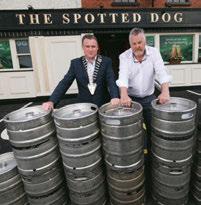



5 News Bites: What’s up and what’s down this month
6 News: VFI call for ‘pints’ tax rebate to save rural pubs; Irish Whiskey Association gives EU-US trade warning
9 Launch of the Irish Pub Awards 2025: The Liberty Belle Pub on Francis Street is the venue for this year’s Awards launch
10 Independent Brewers of Ireland: All the news and photos from the IBI Industry Day
16 VFI AGM: We get the low down from a fruitful few days in Limerick
17 Pub profile: Anthony Morrisson from much-loved Christy’s in Kilkenny tells us how he is doing things his way
20 Beer wonderful beer: Rick LeVert of Kinnegar Brewing relays his passion for brewing to Fionnuala Carolan
38 Campaign Trail: A focus on new products coming to the market
41 Social diary: Check out who’s been out and about this month!
44 Advisor HR: Caroline Reidy, managing director and founder of The HR Suite explains how to successfully navigate workplace disputes
46 A day in the life: Donal Farrell of Mourne Dew tells us about a typical day in his life
We spoke to publican Anthony Morrisson from Christy’s Pub in Kilkenny for our Pub Profile interview this month. One of the things he spoke about that really struck me as significant was the difference in perspective between the last generation of publicans and the modern day publican. He spoke of his father being ‘beholden’ to the pub and this is something that would probably resonate deeply with many children of publicans. There was an acceptance that the business always came first and nothing was more important than keeping the customer happy. So much so that family events, holidays and other life milestones were skipped in order to be in the pub and not disappoint the customer. Anthony says that he decided things would be different on his watch. He works extremely hard but some things are non-negotiable with him - primarily making time for his family and his hobbies so that there is life beyond the pub and his whole self is not defined by it. The traditional mode of allowing the business to dictate family life could answer for the fact that many children of publicans have no interest in taking over the family business because they saw firsthand the sacrifices that were made. Anthony demonstrates that things can be done differently, and the customer is not in charge of your destiny but that a successful business can be run on your own terms.

Fionnuala Carolan Editor
fionnualacarolan@mediateam.ie
Twitter: @drinksind_ie
The traditional mode of allowing the business to dictate family life could answer for the fact that many children of publicans have no interest in taking over the family business because they saw first hand the sacrifices that were made.
Also in this issue, we speak to Rick LeVert, managing director of Kinnegar Brewing in Co Donegal. His dedication to brewing is evident but he also makes sure to balance his work and life so that he doesn’t become burned out. Being dedicated to our work does not mean we need to to bury ourselves in it. Looking after your physical and mental wellbeing and the wellbeing of your staff, will lead to a far more successful business in the long term and ensure that you retain a love of what you do.
Elsewhere in this issue we focus on Summer Drinks and have plenty of drinks inspiration for the season ahead (page 24). We also have a feature on Sustainability (Page 31) focusing on the many fascinating initiatives that are happening throughout the drinks industry and teaching us that there is so much more that we can do to take care of our environment for future generations.
We hope you enjoy this issue and if you have any news, views or comments, please feel free to contact me.
Cheers, Fionnuala Carolan Editor
“There is a rainy day fund there, as Pascal Donoghue likes to call it. It might be time to dip into these funds because if they don’t, businesses will simply not survive.”

“These are challenging times and it is all too easy to forget just what massive strides independent brewers have made in Ireland in the past two decades.”

“I was brought up being told that the man behind the counter was the most important man in the building– not the staff or your family. I enjoy this job but my mentality has changed. I won’t be bullied by the customers so I’m in control and not the customer.”

Bar 1661 in Dublin 7 has recently been named one of the Top 10 Cocktail Menus in the World by the 2025 Spirited Awards. Bar 1661 was recognised for ‘We Call This Power’, a 28-drink celebration of Irish poitín, Irish drinks, and Irish producers.
The All-Ireland Final of the 2025 Irish Restaurant Awards took place at the Clayton Hotel, Burlington Road last month. Dede at the Customs House, Baltimore was named Best Restaurant, while John Kelly of the Lady Helen Restaurant at Mount Juliet Estate was awarded Best Chef in Ireland.
DrinkWell has recently launched in Ireland. Its mission is to offer full-flavour alcoholic beverages that align with health-conscious lifestyles. DrinkWell has been involved in the ‘better for you’ (BFY) alcohol movement, providing options that cater to those mindful of their sugar, carb, and calorie intake.
Familia Torres has been making wine in Catalonia since 1870, but says it may have to leave its current locations to move to higher altitudes in less than 30 years’ time because climate change could make traditional growing areas too dry and hot. The Spanish winemaker has more than 1,000 hectares of vineyards in Catalonia, as well as sites in other parts of Spain, California and Chile.
Diageo plans to cut €444 million ($500 million) in costs over the next three years as it faces mounting pressure from US trade tariffs. According to the company, the tariffs introduced under Donald Trump are expected to cost Diageo $150 million annually.
Moët Hennessy recently informed staff that 1,200 jobs will be cut within the workforce due to low sales as the US tariffs provide additional uncertainty with little hope of sales “bouncing back” soon.






The Vintners Federation of Ireland (VFI) is calling for a 40% rebate on the excise charged to draught products sold in pubs. The VFI says the rebate would help protect rural pubs that play a vital social role in their local communities, while also preserving employment in a sector struggling with soaring costs.
Ireland has the second-highest excise rate on alcohol in Europe, with taxes accounting for nearly 30% of the price of a pint. According to the VFI, the current tax burden is unsustainable and is placing severe financial pressure on publicans, particularly in rural areas.
“Publicans are not asking for a handout – we are asking for fairness,” says VFI, CEO Pat Crotty. “A 40% rebate on the excise charged on draught products is a practical, targeted support that would make a real difference for small pubs across Ireland. These are businesses at the heart of their communities, providing employment, social connection and play a key role in our tourism offering.”
“We welcome the Government’s commitment to support SMEs in the Programme for Government, which acknowledges the increased cost pressures on the hospitality sector. However, it is vital that any measures
introduced benefit all pubs – not just those serving food,” says Crotty.
The VFI argues that while the proposed VAT reduction for hospitality is welcome, it will only benefit pubs that serve food, leaving traditional pubs without support. The draught rebate, in contrast, would ensure that all pubs, regardless of size or location, benefit.
“Rural pubs are facing an existential crisis,” adds Crotty. “We have seen hundreds of pubs close their doors in recent years. If this trend continues, we will lose a vital part of Irish culture and community life. A draught rebate is a simple, fair, and targeted measure that would provide immediate relief. We estimate the rebate would cost €73m annually, a small fraction of the VAT proposal.”
The VFI is urging the Government to include the draught rebate in the upcoming Budget as a critical measure to preserve Ireland’s pub culture and sustain rural communities.
The excise rebate scheme is based on a report written by Anthony Foley from DCU Business School. The rebate proposal works when a pub provides evidence from suppliers that

it purchased a certain number of taxcompliant kegs of qualifying beverage. The rebate of 40% is calculated by Revenue, up to a maximum of €20k. The appropriate rebate is credited to the VAT due in each VAT period of the following year.
For example, a 50-litre keg of Guinness contains 88 pints and generates €47.36 in excise per keg. A 40% rebate would be €18.94 per keg. To receive the full rebate of €20k, a public house would need to sell 1,056 kegs annually or 20.3 kegs weekly. Most rural pubs would not sell this volume of kegs. The annual excise rebate would be capped at €20k per licensed premises.
The rebate applies only to draught alcohol products with a maximum ABV of 5%. In effect, this means it is confined to beer/cider. The restriction of the rebate to draught products ensures the measure is focused on public houses and other bars.
Foundry Vault, situated near Coleraine, Northern Ireland is the UK’s largest Irish whiskey maturation facility. It has recently transformed its entire warehousing operations with Proof 8, the blockchain-backed distillery and warehouse management solution. This shift to a fully digital, real-time cask management solution ensures absolute transparency across its complex bonded warehouse facility. This transition from a manual to a digital approach, enables The Foundry vault to achieve unprecedented levels of operational efficiency and higher standards in compliance.
“If we were still fully reliant on
spreadsheets or an old legacy system to manage cask data, I’d be really worried right now,” says Jacqui Hanna, co-director and warehousekeeper at Foundry Vault. “Instead, we prioritised data accuracy, operational integrity, and

The Foundry Vault team in the warehouse. Proof 8 is a digital-first approach at the core of cask management
customer trust by underpinning our entire operation with Proof 8. The transformation has been swift and game-changing.”
Foundry Vault manages maturing Irish whiskey casks across multiple warehouses in Northern Ireland. As the business expanded, outdated systems like spreadsheets and paperbased certificates of ownership for casks, created major bottlenecks and hindered efficiency in their operations. The prospect of WOWGR reform proved to be the catalyst to digitalise, prompting them to move from vulnerable, error-prone manual processes, to a secure, real-time data management platform with Proof 8.
The Irish Whiskey Association, the trade association representing Irish Whiskey producers on the island of Ireland, together with Drinks Ireland, representing the wider drinks manufacturing sector, has warned that the Irish and EU spirits sectors remain uniquely exposed should no resolution of EU-US trade tensions be found. These organisations recommend the immediate removal of all tariffs on EU and US spirits, allowing the spirits sector to return to the tarifffree environment in which it has found such success.
Irish Whiskey now faces a 10% tariff on exports to the USA, which is the biggest market for this premium product – 95% of Irish whiskey is exported, and exports to the US are worth around €420 million per annum.
The Irish Whiskey Association has recommended that pressures on the EU spirits sector are considered, and efforts to secure a satisfactory outcome to negotiations is prioritised. Overall drinks exports from Ireland to the US total €865 million every year. This 10% tariff is already costing Irish drinks producers thousands of euros every week. This additional cost, coupled with a weakened dollar, is placing major pressure on the sector.
The immediate cost implications and deepening trade uncertainty are negatively impacting markets and businesses for distillers and drinks manufacturers throughout the country.
Both Drinks Ireland and The Irish Whiskey Association are encouraged by the fact that the European Commission has consistently sought to negotiate a deal and has engaged in discussions with their US counterparts in good faith.
Irish Whiskey, Cream and Poitín producers are appreciative of the consultation and communication that both the European Commission and the Irish government have engaged in with affected sectors.
Drinks Ireland and The Irish Whiskey Association believe that a tariff-free environment has worked and will work best for the spirits sector. From the introduction of zerofor-zero tariffs in 1997 until 2018 with the steel/aluminum dispute, the value of the spirits sector on both sides of the Atlantic experienced a growth of 450%.
The spirits sector in both the USA and the EU remain interconnected, however this period of uncertainty and heightened trade tensions puts investments at risk. There are further threats which may impact on the
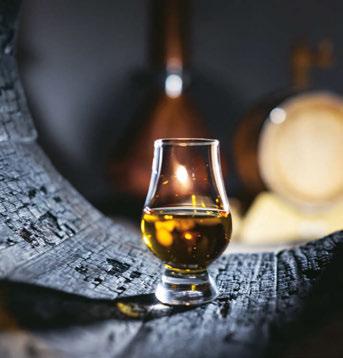
competitiveness of the Irish drinks sector. Ireland remains the primary importer of US casks in the EU, and ex-bourbon and ex-American Whiskey casks are an integral component of the Irish Whiskey.
As per the previously announced retaliatory list for steel/aluminum trade dispute, casks will be subject to a 25% tariff should a negotiated deal not be found.
This, compounded with the (current) 10% on Irish exports to the USA, would leave Irish Whiskey producers at a unique disadvantage, particularly when compared to other spirits categories in competing markets.
All these developments come against the backdrop of the recent conclusion of the UK-India Free Trade Agreement – which ensures an immediate 50% reduction in tariffs for UK whiskies and spirits to India. This secures a more favourable trading environment for our direct competitors, placing EU products at a further, unique disadvantage.
Drinks Ireland and The Irish Whiskey Association recommend that these pressures on the EU spirits sector are considered, and that efforts to secure a satisfactory outcome to negotiations is prioritised.

Drinkaware reports that 45% of adults are now more likely to drink at home compared to the past year, up from 38% in 2023. New data shows that 45% of adults who drink are now spending more on alcohol for home consumption than in pubs and restaurants, with the trend peaking at 53% among weekly drinkers.
Dearbhla O’Brien, CEO of Drinkaware, said: “As the cost of living rises, consumer habits are changing and more of us are drinking at home than in pubs and restaurants, and this comes with additional challenges in moderating our drinking. When drinking at home, it becomes easier to overpour and lose track of how much we’re drinking. At home, there’s less
restraint, and people may not be as aware of the quantity of alcohol they’re consuming, leading to overconsumption.”
Drinkaware provides a free and easy-to-use drinks calculator , a helpful tool to monitor alcohol intake and estimate the time required for the body to process alcohol.
47% of those who drink more at home say they are interested in monitoring and adapting their relationship with alcohol, compared to 39% of all adult drinkers. To help people monitor their alcohol intake, O’Brien added: “Just because you’ve stayed in doesn’t mean you’re safe to drive the next morning. Alcohol can stay in your system longer than you might think. Drinkaware’s online

drink-driving calculator can help you assess when it’s safe to drive after drinking.”
On average, it takes your body at least one hour to process a standard unit of alcohol. A standard drink is defined as containing 10 grams of pure alcohol, which is equivalent to half a pint of beer, a small glass of red or white wine, or a pub measure of spirits.
Irish consumer spending surged in April, with card outlay by Bank of Ireland customers up 8.3% – a notable acceleration from March’s 5.9% increase. The timing of Easter, which fell entirely in April this year, played a key role in driving this increase.
Social spending saw a particularly robust rebound, up 7.1% year-on-year, with restaurant spending jumping 8.2% following a sluggish first quarter.

Retail and services spending were both strong, rising by 5.4% and 5.9% respectively.
Spending on Bank of Ireland debit and credit cards reflected this momentum, with €1.3 billion spent on retail, €700 million on services, €340 million on social activities, and approximately €500 million withdrawn from ATMs. While ATM withdrawals remained flat in April, they were down over 5% in Q1 compared to the same period in 2024, continuing the trend toward digital payments.
Despite a dip in consumer confidence to a two-year low, spending on big-ticket items remained resilient. Hotel spending surged 10%, electrical goods rose 9.1% and hardware was up 5.3%. Grocery spending also climbed 7.3% to €613 million, while accommodation spending increased by 10.5%, reflecting strong domestic and international tourism during the Easter break.
Social categories saw a welcome lift, with entertainment spending up
6.2% to €98 million and dining and drinking out up 8.2% to €222 million. Notably, cinema spending soared 43% year-on-year, while tourist attractions and spa services both saw 26% increases—likely aided by belated Mother’s Day celebrations.
Commenting on the figures, Bank of Ireland’s chief economist Conall MacCoille, said: “Irish consumers may have been nervous about US tariffs and a more uncertain economic outlook in April, but the hit to sentiment hasn’t been sufficient to alter key spending decisions. The €3.7 bn spent on Bank of Ireland credit and debit cards in April was up 8.3% on the year, an acceleration from March. True, the timing of Easter gave a seasonal lift, but there was broad based growth across a range of sectors, from groceries and entertainment to hotels and hardware. Furthermore, spending growth is now well in excess of CPI inflation at 2.2%, embodying substantial real gains in consumption.”
The Irish Pub Awards 2025 is free and open to all members of the VFI and LVA. The closing date for entries is Friday, 30 May 2025

Pictured at the Irish Pub Awards 2025 launch are (back row l-r) Jef Gartland from Musgrave MarketPlace; John Clare from Carling; John Cassidy from Edward Dillon; Ken McIntyre-Barn from Bulmers; Jordan Walford-Jones from Diageo; Cormac Murphy from Irish Distillers Pernod Ricard; Barry Gray from BOI Payment Acceptance; Matthew Moloney from Heineken; Seán Donegan from IMRO (front row l-r) Michael O’Donovan, VFI president; Willie Ahern, LVA chair; Michael Quinn from Fáilte Ireland
The Irish Pub Awards 2025 was launched on 16 April at the Liberty Belle pub, Francis Street, Dublin 8, winner of the Best Local Pub in last year’s Awards.
The Irish Pubs Awards are jointly presented by Licensed Vintners Association (LVA) and Vintners’ Federation of Ireland (VFI).
Pubs are now free to enter up to ten categories with judging set to take place over the summer. The Irish Pub Awards Gala night, where the overall National Pub of the Year will be revealed, along with all category awards, will take place in Dublin on Wednesday, 12 November 2025.
This is the seventh year of the Irish Pub Awards, which celebrate excellence and innovation across various categories in the pub sector. Previous ‘Pub of the Year’ winners include, Malzard’s Pub, Stoneyford, Co. Kilkenny, Aunty Lena’s, Adare, Co. Limerick, Gleeson’s of Booterstown, Co. Dublin, Paris Texas, Kilkenny City,
The Gylde Inn, Annagassan, Louth and The Porter House, Castlebridge, Wexford, while the individual category winners reflect the extraordinarily high standard of pubs around the country.
The Irish Pub Awards 2025 are open to all members of the VFI and LVA. Entry to the awards is free –anyone interested in entering can do so via the dedicated website: www. irishpubawards.ie. The closing date for entries is Friday, 30 May 2025.

Michael O’Donovan, VFI president; Fionnuala Carolan, editor, Drinks Industry Ireland and Willie Ahern, LVA chair
The ten categories are: Best Food Pub; Best Tourist Pub; Innovative Pub of the Year; Best Local Pub; Best Outstanding Customer Service; Best Music Pub; Best Late-Night Bar; Best Outdoor Space; Best Digital Innovator and Best Match Day Pub.
The 70 regional winners will be showcased as best in class in their region and will receive a prize package to the value of €20,000, comprising management training and media coverage to help them develop their business. The media coverage will include a profile piece in an Irish Independent awards supplement on the day of the awards presentation on 12 November.
Addressing the launch of the Irish Pub Awards 2025, VFI president Michael O’Donovan said: “The Irish Pub Awards are a vital opportunity to recognise the exceptional standards that define our pub trade - from hospitality and service to creativity and community spirit. As we continue to face real challenges in the sector, these awards remind us of what makes the Irish pub worldrenowned: its people. I encourage every publican to get involved and help us showcase the very best of our industry.”
“We are also extremely grateful to our sponsors, whose continued support makes these awards possible. Their commitment reflects a shared belief in the value and future of the Irish pub. I look forward to the judging process ahead, which shines a light on excellence across the country, and to celebrating with all our finalists at the gala awards night in November.”
Chair of LVA, Willie Aherne, announced: “Irish pubs play a very important part in Irish social culture. They are at the heart of our communities and a central part of our hospitality and tourism sectors. Pubs are hubs that allow people to come together. At a time where conditions are becoming increasingly challenging for Irish hospitality, it is important to note the positive contribution being made by our pubs to the economic and social life of Ireland. We look forward to seeing the cream of Dublin pubs and those from around the rest of the country recognised through this year’s award programme.”
Drinks Industry Ireland is the trade media sponsor for the Irish Pub Awards. n

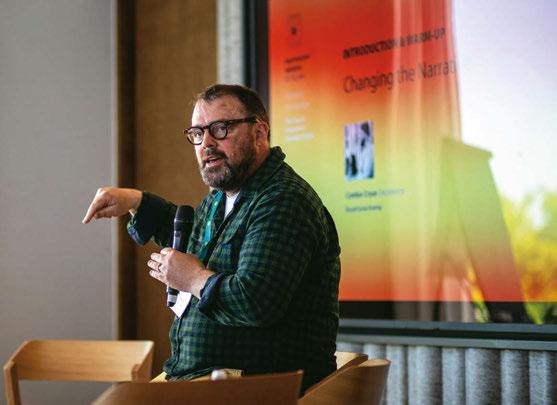
Organised on a voluntary basis by members of the Independent Brewers of Ireland (IBI) and made possible by the pro bono contributions of chairs and panellists, the Independent Brewers of Ireland (IBI) Industry Day was facilitated by Bord Bia and held at Bord Bia’s Global Hub in Dublin.
Open not only to IBI members but to all businesses in the independent brewing and cider-making sector, the over-subscribed event was attended by a large and engaged audience from across the island, representing breweries of every size and business model.
Welcoming the packed house, IBI

chairperson Libby Carton of Kinnegar Brewing remarked that in Ireland the independent brewing industry is young enough to clearly remember its beginning, yet old enough and wise enough to view the present with the cold eye of reality.
“These are challenging times and it is all too easy to forget just what massive strides independent brewers have made in Ireland in the past two decades,” she said. “We have a wealth of knowledge and experience. We have ambition. The aim of Industry Day is to give us time to collectively think, reflect, imagine, and determine our future,” she said.
In an at times poignant introductory talk, event moderator Combie Cryan of Round Corner Brewing in England drew on stats and facts from a recent SIBA report in the UK to highlight the rollercoaster that independent beer has ridden. He pointed out that “despite the closure of a significant number of breweries, the overall output of beer from independent producers has risen by 10%, proving that demand is actually growing. There is still growth and still significant consumer interest in beers beyond the portfolios of the big macro brands.” Indications are that the Irish market is mirroring the British market and showing overall growth.
“There’s no question that our sector faces challenges, particularly in the area of market access, but we’re a maturing industry and we have tremendous ambition and commitment.”


A programme of six panel discussions, chaired by experts from both inside and outside the sector, addressed a series of topics relevant to the industry. Experts as diverse as GAA+/GAA Marketing head Noel Quinn, Drinks Ireland’s Cormac Healy, Irish Country Living journalist Janine Kennedy, Bricolage’s Viv Chambers, Enterprise Ireland’s Dominic Schöne and Bord Bia’s Michael Jacob joined a range of individuals from every corner of the beer industry to share ideas and respond to a fullyengaged audience’s questions. Topics ranged from building an independent Irish beer community to market access in the on-trade in the face of continued dominance by heavyweight macro competitors. Insights on coping with the increasing legislative burden and arguments for exploiting the practical economic advantages of sustainable production practices drew lively comments and questions.

Debates on the merits of the export versus domestic markets, and the continuing relevance of new product development, completed an intensive and productive day. “The atmosphere throughout the day was incredibly upbeat”, remarked Seamus O’Hara of Carlow Brewing. “There’s no question that our sector faces challenges, particularly in the area of market access, but we’re a maturing industry and we have tremendous ambition and commitment.”
Summing up his key take-outs from the day, Bob Coggins of The White Hag singled out one word: relevance. “We have to know our consumer, know our community, and bring them what they need and want,” he said. “We have to remain relevant.” “Things are challenging and we need to work smarter and harder to succeed”, concluded Tom
Cronin of Rye River Brewing Co, “but we have the skills, the experience, and the commitment to achieve success. We’re no longer the new kids on the block, we’re part of the fabric of the beer world and we’re here to stay.”
Ireland’s longest serving independent brewer, Cuilan Loughnane of Whitefield Brewery, reflecting on his 26 years in the industry, was adamant: “The amount of creativity and talent in our sector is phenomenal. Give us a fair crack of the whip and we’ll flourish and do Ireland proud.”
The Independent Brewers of Ireland (IBI) is the ofcial representative trade body for independently operated microbreweries in Ireland. The organisation is run by brewers, with its chief aims being the promotion, support and furthering of the Independent Irish beer and brewing sector. n


Cork native, Michael O’Donovan is the new president of the VFI. He spoke to Fionnuala Carolan about how business costs need to be addressed and the importance of protecting our unique pub industry
Michael O’Donovan is the new president of the Vintners Federation of Ireland (VFI).
A third-generation publican from Cork, he has extensive experience in the hospitality sector and a deep understanding of the challenges facing publicans across Ireland.
O’Donovan owns The Castle Inn on South Main Street in Cork, a family-run pub that has been in operation for over a century. His long-standing involvement with the VFI includes serving as chair of both the Cork City and Cork County branches, as well as representing Cork on the National Executive Council.
He succeeds John Clendennen from Ofaly who prematurely finished his tenure after running for ofce with
Fine Gael and was elected as a TD in his local constituency.
We spoke to Michael as he was driving up the M7 on his way to a meeting in Dublin. Being president of the VFI means that the day job still needs to be maintained so he is lucky that his parents, Dennis and Mary, are in a position to help him out during his time as president.
“I’m a third-generation publican and my parents still live over the bar, which is very lucky for me because they help out when I’m away and I’m on the road a lot at the moment,” he explains. “It’s a busy time but if you grow up working in the hospitality industry, you are used to long hours and putting in the shift, as the man says,” he laughs.
His grandfather’s side of the family was involved in a number of pubs and hotels so the hospitality business is certainly in the blood and when Michael finished school he attended Shannon College of Hotel and Management. “I did my degree in hotel management and at the same time did a Bachelor of Commerce in UCG,” he explains, showing that he has never shied away from hard work.
His father, Dennis was involved locally with the VFI from when it set up in the 1970s but he never went forward for national positions. Michael travelled after college, spending time working in Germany, England and then back to Dublin. In his late 20s, he came back to work in Cork.
He says he “fell into the VFI” after initially just joining the golf society. “I took on a full-time job in the bar,” he explains. “I was a keen golfer at that stage and there was a Vintner’s golf society that I joined and through the golf society, I was asked if I would join the local Cork city committee and here I am 25 years later as national president of the organisation.” His journey to the top job included the position of county chairperson in Cork and acting as spokesperson for the VFI during the Covid years, which he says gave him an appetite to get more involved.
Michael has seen many challenges over the years and like most, he says that Covid was the biggest challenge ever to beset the industry but another that stands out in his memory is the introduction of the smoking ban in 2004. “When that [the smoking ban] came along, it was a challenge because people didn’t know what was going to happen but I think that passed after a couple of months as people adapted but in 2020 when the pubs were closed, it was the scariest time for publicans because there were still bills coming in for insurance and broadband and phones. The doors were closed and we were so dependent on the help from the government and then we came out of that crisis and went straight into Russia invading Ukraine where energy prices were inflated overnight so the last five years have been a real challenge. But hopefully we are getting through it as last year we saw the least amount of closures across the country since 2018,” he reveals.
He feels like in terms of the industry, publicans who have weathered the cost of living crisis in the last few years will hopefully continue, whether that’s from a family member taking over or a new entrant.
“My hope would be that the pubs that are there now will be here for future generations, protecting the
The last year we’ve seen the least amount of closures across the country since 2018
culture that we have in the pub industry here in Ireland. There are Irish bars throughout the world but the best Irish bars are still here at home so it’s important that we protect them and hold on to them and it’s something that tourists really love about Ireland,” he says.
The cost of doing business remains the biggest barrier to trade for publicans. Between wages, energy and materials, publicans are being hit by cost hikes from all sides. The general cost of doing business is on the tip of every publican’s tongue and Michael cites paper products as an example of a cost that is not seen but has to be absorbed. “Paper products have gone through the roof – till roll, hand towels, toilet rolls and these are all costs that the general public don’t see but they all have an impact on the bottom line. When there is a price increase from suppliers, the price of the drink increases but prices of other products are going up all year around and generally a publican’s prices don’t increase to keep pace with them. It’s just a huge cost burden and many publicans are running on a very thin margin at the moment,” he explains.
So how can government ofer meaningful support, because the types of grants they have received up until now are being labelled as mere band aids for the problem? “We’ve the second highest excise duty in Europe and that is something the government could look at and they could look at reducing excise on even draught products, not all alcohol products,
which would help the publican/ hospitality industry here in Ireland,” he suggests. “They could also look at the higher rate of VAT. If that was dropped one percent this year and one percent next year, it would give everyone a little more money in their pocket and would help the economy and help publicans. We pay 23% VAT on all our alcohol. If it went down a percentage that would give us some room to breathe and maybe we could even invest some money back into our businesses which is very hard at the moment with the cost pressures on us.”
He is calling on the government to use surplus budget funds to pay for these changes. “There is a rainy day fund there as Pascal Donoghue likes to call it. Maybe it’s time to use that rainy day fund to help our own economy for the next few years and if the tarifs [from the US] don’t hurt our economy, that money can be replenished again when they run surpluses on the budget again. It might be time to dip into these funds because if they don’t, businesses will simply not survive.
He points to what is happening in France where the government is o fering grants to people to open pubs in towns that have lost all their pubs. “We have a great pub culture and we have to protect it because when these pubs are gone we will miss them and we could end up like France having to introduce grants to encourage them back open. We just need a little bit of help to get us over the line to make it sustainable again and make it something people want to do. It’s our heritage and culture that we are synonymous for around the globe. It should be protected,” he stresses.
So many pubs are operating as quasirestaurants and those doing food, say they wouldn’t survive without it. However, taking on a food ofering is no small feat and Michael attests to the fact that many rural pubs would still
“I was a keen golfer at that stage and there was a Vintner’s golf society that I joined and through the golf society, I was asked if I would join the local Cork city committee and here I am 25 years later as national president of the organisation.”
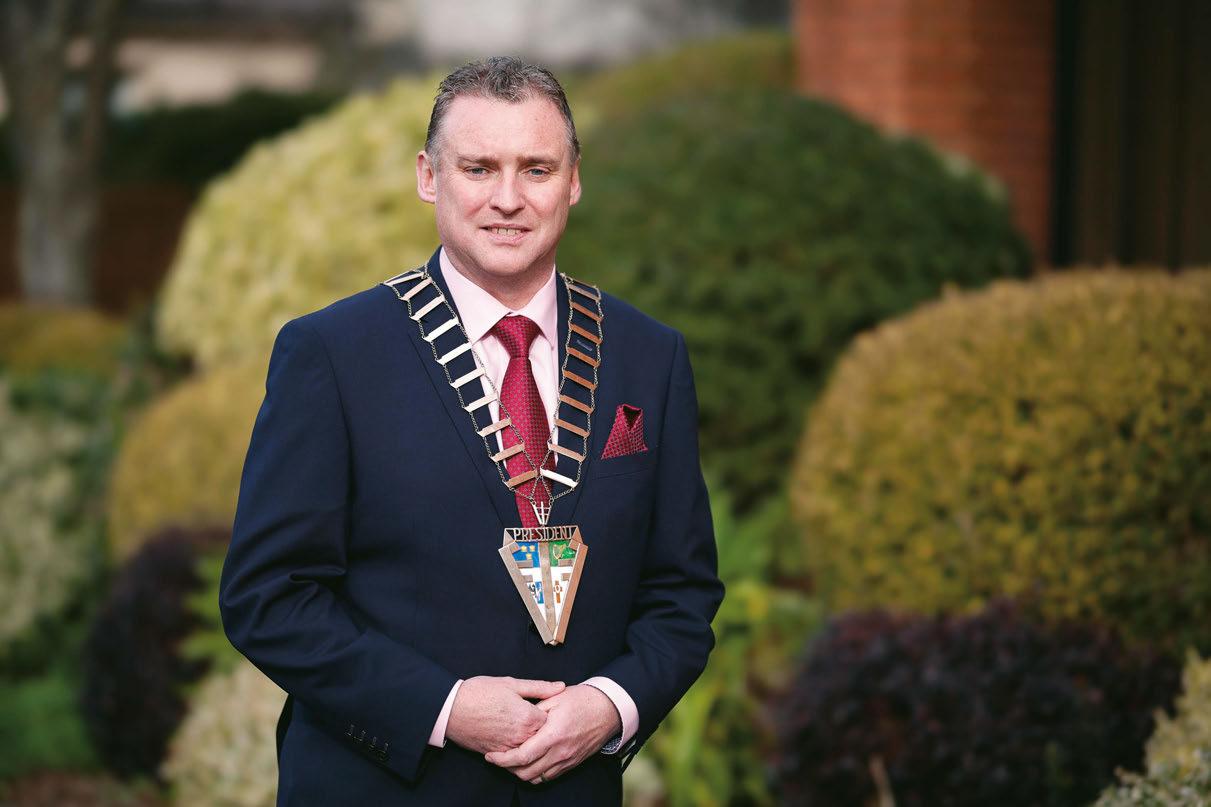
We see Irish bars throughout the world but the best Irish bars are still here at home so it’s important that we protect them and hold on to them and it’s something that tourists really love about Ireland
not do food, including his own pub, that just ofers a fine range of crisps, so he feels that although it’s helpful, it’s not a necessity to survival.
“Lots of rural pubs wouldn’t do food and they would be the centre of that community and drink wouldn’t always be the draw either. I was in a pub over Christmas and there was a bingo night on and 50% of the people weren’t drinking but there was a great atmosphere and it was a fundraiser for a local GAA club and everyone in the community was there,” he explains. “It was a fantastic occasion I have to say and that pub doesn’t do food but it’s doing good business. People were having tea and cofee, a mineral and sparkling waters. It was still a good night for the publican and that is replicated a lot over communities in
that the pub is not just for drinks. They host card nights, dart nights, pool nights, bingo nights and socials for sports clubs. The pub is the base for a lot of those community events. A lot of these communities have lost their post ofce and their corner shop so the pub is the last community meeting place they have.”
Michael is married to Clodagh and they have three children, two boys Eoghan (19) and Cian (17) and a 14-year-old girl called Tara. “My two boys work in the bar at the weekend. Tara couldn’t wait to be 14 as she can ofcially collect glasses and stock shelves now. The novelty will wear of soon enough I’m sure but she wants to be on the payroll!”
He says there have been no discussions with his eldest yet about the future of their pub. “It’s not a conversation we’ve had as he wants to go to college after his Leaving Cert. It’s something that will be there in the background if they want it but like me, my parents didn’t force me into it. They let me go of and do what I wanted to do. The worst thing I could do is force them into it as that would turn them of it so they need to find their own feet.”
Having vowed never to do a 9-5 job, he believes that you have to love the industry to stay in the pub business for the long haul. “In our industry you work 50 weekends of the year so you have to want to do it and love it or you’ll turn of it pretty fast. I have always loved it.” n

The Vintner’s Federation AGM was a mix of serious discussion around how to support the industry and some time out to socialise and enjoy the local hospitality
The 2025 AGM of the Vintners’ Federation of Ireland took place in Limerick from 1214 May, drawing a large and engaged attendance of VFI members and trade partners from across the country. Held in the Limerick Strand Hotel, the event marked the first time in over two decades that the AGM was hosted in the Treaty City and it delivered a memorable experience that mixed serious discussion with local hospitality.
The week started on Monday with the ever-popular Andy Byrne Memorial Golf Competition in Limerick Golf Club and a prize presentation in South’s Bar. Tuesday saw the formal business of the AGM get underway, with delegates gathering to debate and vote on a range of motions put forward by county branches. The high turnout reflected members’ continued commitment to shaping

Federation policy and addressing the major challenges facing the sector.
This year’s AGM also served as the launchpad for the VFI’s call for a 40% excise rebate on draught products sold in pubs.
VFI president Michael O’Donovan described the proposal as a vital measure to support rural pubs and ensure the survival of an essential part of Irish social and cultural life. The motion gained strong backing from delegates, reinforcing the Federation’s focus on securing meaningful relief for non-food pubs that continue to feel the pressure of rising costs. Outside of the meeting room, the sunny weather

added to a buoyant atmosphere throughout the city.
The ofcial programme included visits to key local attractions in Foynes, Adare and Lough Gur, with members enjoying the rich history and warm welcome of Limerick’s surrounding areas.
Over 370 guests attended the AGM gala dinner on Tuesday evening in the Strand Hotel. Guest speakers, dancing, and the traditional prize draw made for a lively celebration. Suppliers and sponsors were also well represented, reflecting the strength of VFI’s ongoing partnerships across the hospitality industry. n
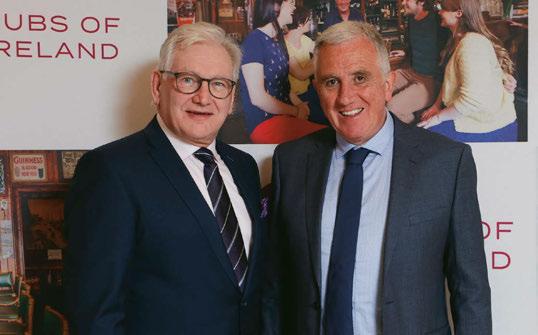

Fourth generation publicans and Kilkenny natives, The Morrisons have run Christy’s in Kilkenny since the late 1980s. Anthony Morrison, current proprietor, spoke to Fionnuala Carolan about managing a busy pub, popular with youngsters who want a diferent experience to past generations
Christy’s Bar is somewhat of an institution in Kilkenny. It’s a go-to spot for young adults, in part due to its huge beer garden. Anthony’s parents Josie and Christy Morrisson ran the bar until Christy passed away in 2019. Now their three sons Anthony, Liam and Brian run the show.
“We are fourth-generation publicans,” says Anthony. “My mother Josie’s father had a bar in Ballyhale, South Kilkenny and that’s where I was born and bred. My mother met
my father Christy Morrisson in the late 50s. In 1984 there was a bit of a micro recession and they decided they would move from the country to the town. They moved into this bar in Patrick St in Kilkenny in 1987. They sold the pub in Ballyhale for €87k and bought this pub for €83k.”
The move from Ballyhale into Kilkenny turned out to be a shrewd one. Christy’s is the first and last pub out of Kilkenny on the Waterford Road and they are a seven-minute walk to Kilkenny Castle. “That’s the
centre of the universe in Kilkenny,” explains Anthony.
Anthony’s mother Josie still works in the pub every day. “She mightn’t be serving drinks now because it’s all about whiskey and cocktails rather than pints and she was the pint of Guinness lady. We use her for crowd control mainly,” he says with a grin. “She can spot trouble before it starts. We’ve a very small pub but we have a very large footprint when you take in the beer garden and the snooker room.”
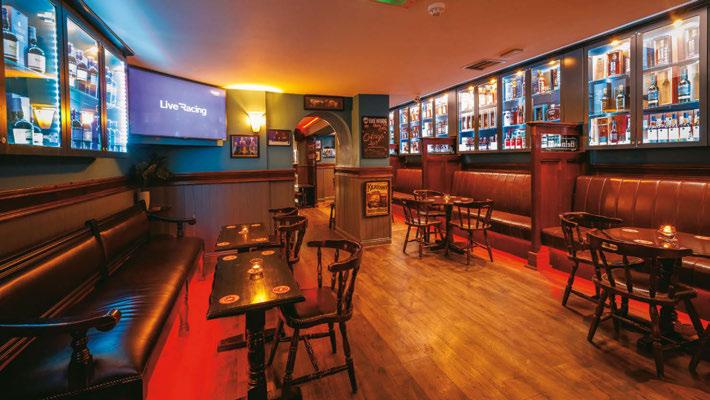
Growing up above the pub meant that work and family life lines were often blurred with his parents “beholden to the pub and the customers” all of their lives.
“The only place the customers couldn’t go was the family bathroom,” explains Anthony. “You could find customers in your sitting room, and if there were the afters of a funeral, the widow might be brought upstairs to one of the bedrooms to be consoled. I think there was even a child born at one stage,” he recalls. He now lives away from the pub and has instilled boundaries between the bar and his family life and ensures his staf also receive a good work/life balance.
“This is not a criticism of my own father but he would have never seen me play sport because he was in the bar seven days a week whereas my brother and I would have a very diferent dynamic. There’s always one of us there so rather than us both being there, we separate it. I have time to go training and do things with the kids and he has time to go and walk his dogs. I have two other full timers and two part timers and we try to work it that everyone gets their needs met. That helps with the longevity,” he explains.
The original part of the pub is of traditional style but in recent years they have extended the premises to include a snooker room and a huge beer garden. “It’s a small traditional pub that holds 80 people and a beer garden which takes up to 400, the lawn area that holds another 200, the Green Room (aka Snooker Room) will hold about 50 and the Hatch that will hold about 20 so
all in all there is capacity for over 700 plus people on site.” Horse racing and snooker are a big focus for the regular patrons so you will always find racing on the telly and the pool room in use.
Covid rejigged their model in terms of how busy they find themselves with the busy periods now between 3pm10pm. “Pre-Covid the busy times of the day were between 7pm-1am and I wouldn’t have been out of the pub until 2.30/3am. Now I’d be home an hour after closing most nights. It’s improved our lifestyles,” says Anthony.
It’s interesting to note this change in busy periods that has come about and although Anthony has noticed it since Covid restrictions have passed, it’s probably more due to changing lifestyles and priorities of a new generation. Anthony says that the 1825 year olds are quite content to go home by 11pm so they can go to the gym the next morning. “I had 17 lads from a team here yesterday and what I find is that they are coming in for a few drinks and getting a pizza from the pizza truck and then they head of home. The customers that continue the night down the town are my age – lads that are married with kids and are the ones out for the night.”
They employ Jack Walsh of Blásta Pizza to come and set up his pizza truck in the beer garden at weekends and this has been a real solution to providing a food ofering without having to modify the whole premises.
It would be understandable if publicans were getting nervous about the fact that young people are not drinking as much but Anthony doesn’t see it that way. “You have to have
The original part of the pub is of traditional style and there is a big focus on horse racing which you will often find showing on the TVs
a certain spend from every journey. You have your good strong regular customers who will come in for a few drinks four to five days a week. You can pre-budget what they are going to spend. The younger crowd – they might have €20/€30 to spend. They would spend € 10 on a cocktail even though they only had €30 to spend. They’ll have 2/3 of them and then they will sit there with nothing in front of them for the rest of the night and they don’t mind that. They would prefer the nice fancy drink as they are imageconscious and like to post photos with their drinks. They’ll get one of those fancy fishbowl gins as the value for them is in the experience. Getting drunk is not part of it anymore. It’s about visuals,” he says.
Non-alcoholic drinks are of course on the rise too. They have had to redesign the bar to fit more zero-zero taps in and now they serve Carlsberg 00, Heineken 00 and Guinness 00, three zero gins and two zero vodkas. They also have a zero spiced rum and a nosecco on ofer to fulfil this new demand.
Anthony has experienced an interesting new phenomenon as the rise of zero drinks takes hold. “People want zero-zero glasses to go with the drink because they can’t be seen to be drinking. Hurlers want people to know they are not drinking. The pregnant woman wants the zero glass because they are drinking a zero gin and don’t want people to think they are drinking alcohol. People are very conscious of that,” he explains.
Another change that has come about in recent years is the disappearance of cigarette machines in pubs, illustrating that the government’s eforts to make Ireland smoke-free are working. Anthony says they wouldn’t even consider having one now. “I got rid of my cigarette machine November two years ago. Last weekend we had a busy few days with a few football teams in and a party and only one person out of maybe 600/700 people here over the weekend asked for a vending machine. There is no value

in it now. If I was to have a cigarette machine, I would have to pay € 1,500 for a machine and it wouldn’t pay that now.”
As habits change, businesses need to respond to these and change accordingly. Following the publication of the NTE Taskforce Report, Kilkenny City was successful in being designated by the Department of Tourism, Culture, Arts, Gaeltacht, Sport and Media as one of nine pilot towns
and cities in the country that will prepare and implement an action plan setting out a range of interventions to support the coordinated development of the night time economy.
Anthony sits on the NTE Panel for Kilkenny representing the hospitality sector and they are looking at ways to modify how business is conducted in the city. “There are lots of business people like hairdressers and shopkeepers on the panel too and
we’re trying to look at the city past 6 o’clock. As pubs, we are always open but other businesses close by 5/6pm and we’re looking at the likes of people being able to get their hair done or their eyes tested at 9pm. It’s not all about drinking and socialising. In tourist locations abroad, there is a 24 hr economy. We need to ofer more here,” he says.
Anthony has a real can-do attitude and a positive outlook, which is why this is such a successful business. He mentors young people and has given a lot of younger people their first jobs. He likes everyone to feel welcome in his bar and for there to be a good atmosphere. However he made a decision along that way that he would run the pub his way and change how things were done in the past.
“I was brought up being told that the man on the other side of the counter was the most important man in the building – not the staf or your family. I don’t tolerate bad behaviour. I enjoy this job but my mentality has changed. I won’t be bullied by the customers so I’m in control and not the customer. I have a young pub – a starter pub, a family pub that goes with you on the journey. We are a bit of an institution. I’ve seen full circles of families born, reared and died here. And we want to keep doing that but maybe a bit more on our terms in the future,” he says. n
They would prefer the nice fancy drink as they are image-conscious and like to post photos with their drinks. They’ll get one of those fancy fishbowl gins as the value for them is in the experience. Getting drunk is not part of it anymore. It’s about visuals.
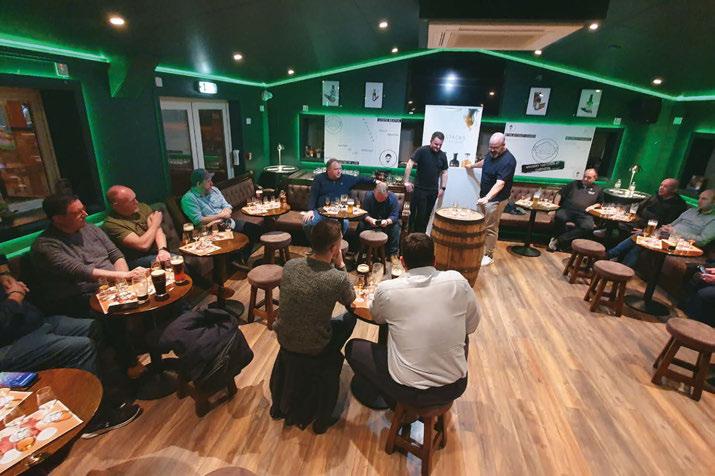
Rick LeVert, managing director and head brewer of Kinnegar Brewing spoke to Fionnuala Carolan about the company’s commitment to innovation driven by the uninspiring beer landscape that once existed in Ireland and how the term ‘craft beer’ is being phased out

Kinnegar Brewing is an Irish brewery located in Co Donegal, run by husband and wife duo, Rick LeVert and Libby Carton. From the very early days of brewing on Libby’s family farm by the beach in Donegal, Kinnegar Brewing has grown steadily to become the third largest independent brewery on the island in terms of output. Last year they
produced 1.5 million litres of beer from their K2 Brewery in Letterkenny and grew turnover from €2.5m in 2020 to €4.3m in 2024. In fact, every year since year one, 13 years ago, they have made a profit and used that profit to expand the business.
To succeed as a brewery in Ireland today, Rick is adamant that you have to be able to do it all. You can’t just

have a great brand or marketing campaign, or one or two great products or even huge distribution. It’s about having the complete package in order to survive, compete and most importantly grow. For Kinnegar, they are acutely aware that generations are changing and breweries in Ireland need to find ways to adapt. From low and no, IPAs, fruited beers and light flavoured sours, to their newest launch Jackrabbit - a premium Irish ginger beer - Kinnegar is constantly running trials and innovating.
Kinnegar Brewing was created from, dare I say it, nothing. Neither Rick nor Libby had a background in drinks production. Libby studied visual
communications in NCAD and Rick was working for a number of years in the design industry in the States and Germany.
“We actually started our own ofce back in the 1990s in Germany,” Rick reveals. “We shifted the design studio to Dublin and we eventually moved to Donegal. My primary degree is in economics and I have a Masters in Film and then I did a Master’s in Visual Communications as well.”
The couple currently reside in Rathmullen about 20 minutes north of where the brewery is in Letterkenny. After living quite a cosmopolitan life, you imagine that relocating to Donegal would amount to a slower pace but Rick assures us that this is not the case. “People think it’s a slow pace of
life but in business, it’s the same as anywhere else and just as pressurised. There are probably fewer distractions in Donegal as opposed to life in a city. You’re pretty shattered from work so we tend to shut down for the weekends and there aren’t as many social distractions as there might be in a city so we take that as a positive. We certainly didn’t notice the first few months of the Pandemic as we didn’t see that big a diference in our social lives,” he laughs.
So what led to this life-changing idea of becoming brewers? “There wasn’t an epiphany moment,” Rick assures us. “I hate to sound flippant about it but my interest in beer originally came from drinking beer. We were in the States at the start of the craft beer movement
Craf beer became an elitist term and the beers were very high in alcohol so that has nothing to do with what we are doing. It was a fad or a trend.
There is nothing trend like about what we are doing
and we saw things changing there. We were exposed to diferent styles of beers and diferent flavours and became more interested in that.
“When we were here in the early 2000s, we found that the beer landscape was not that exciting and the beers that were here weren’t particularly good, except for Guinness, which we both enjoy a pint of. The exposure to beer, coupled with curiosity and the fact that I was tiring with design meant I was starting to look at what the next stage of my career would bring. I couldn’t see myself in design for another 20 years.”
He believes that there is a strong correlation between design and brewing, as a lot of it comes down to problem-solving. “In the brewery it’s a constant process of troubleshooting, trying to figure out ways of adjusting and optimising. There’s a big overlap between the two. In the end curiosity led us to build our own brewery,” he says.
They started with a pilot activity in an outbuilding where they were living in Rathmullen by setting up a 50 litre facility where they learned how to brew. “We weren’t home brewers. We saw it in a way of developing skills and learning what beer was about and developing our own recipes and that ran over a two-year period but we were actually registered with Revenue and the HSC so it was a fully certified facility.”
Demonstrating how their original operation was particularly small, Rick recalls how Revenue were taken aback by the set up during their first audit. “It was quite funny when the Revenue ofcers came out and they weren’t that used to dealing with alcohol facilities, as there weren’t too many breweries in the country. Four of them came out and we had to take them into the facility one at a time because it wasn’t big enough to hold them all. They laughed about it as well. It was very small scale.”
Parallel to the piloting activity, Rick went of to Berlin to undertake a course on brewing science and technology in the Technical University there and subsequently travelled to the Centre of Brewing at the University of California to give him a broader understanding of brewing and beer production. From there, they were able
When we were here in the early 2000s, we found that the beer landscape was not that exciting and the beers that were here weren’t particularly good

The leap from a pilot facility to a commercial facility over a two year period increased production from 50 litres to 1,000 litres
to plan the leap from a pilot facility to a commercial facility over a two year period increasing production from 50 litres to 1,000 litres. They used a couple of beta testers in Dublin and Donegal, as a way to get feedback from the market and they incorporated that feedback at the next stages of production.
Craf beer is no more
There is a movement at present from the Independent Brewers of Ireland, of which Libby is the chairperson, to try to move away from the term craft beer. We asked Rick what was behind this change in the industry. He says that they have never publicised themselves as a craft brewery and that the term has become obsolete. “The reason we avoided craft is because for anyone that comes into our facility will see it’s a fairly high tech place,” he explains. “Craft tends to go with artisan. What you find in our brewery, is exactly what you would find in St James Gate. There’s a much higher level of automation in St James Gate but there’s not much of a gap between what they do and what we do in terms of scale.”
He says that craft is really a meaningless term especially since the bigger breweries started developing craft ranges by following the emerging trends. “A lot of the big macro breweries saw where the industry was going, and they were a little bit nervous about all these small guys popping up and so many of them started developing these sole craft ranges so suddenly there was this beer being made by a big international brewery but they are selling it as a craft beer and the consumer doesn’t really know what craft means so it’s a meaningless term.”
“Craft beer became an elitist term and the beers were very high in alcohol. It was a fad or a trend. There is nothing trend like about what we are doing,” he clearly states.
Regarding the trade tarifs from the US, Rick is not overly concerned because they have never pursued the American market and don’t export anything to the United States at present. Even with their first commercial brewery they couldn’t meet the demands of their product on the island of Ireland so it made no
sense for them to pursue export at all. “We didn’t have the capacity to engage in export. And then when we opened up the new facility in 2017, just after the Brexit referendum, and had some extra capacity where we could look into exporting and we thought that the EU is our natural back garden so to speak so we’ve always concentrated on export in the EU so that is France, Spain, Italy and Holland. Exporting to the EU is relatively seamless and there is a centralised duty system and so it makes sense for us. That said, we see ourselves as a domestic brewery and 90% of our product is sold on the island of Ireland. Breaking it down, 80% of their product is consumed in the Republic, 10% in Northern Ireland and 10% to Europe. “There is some scope to grow that export market and we will start looking at the British market as there are some opportunities we see there but first and foremost we are a domestic brewery. Our customer base is across Ireland,” he says.
He says that brewing is a hard business with tight margins and if you can’t manufacture efciently, it doesn’t matter how good your beer is as your business won’t survive. His background in economics has helped them stay out of debt even when costs were spiralling as they looked for savings internally and financed growth from profits rather than loans. “Our growth has been in manageable chunks. We didn’t overburden the company with debt. We finance our growth out of our operation profits,” he explains.
Kinnegar has 12 products in the core range with a lot of diversity throughout this range. The biggest selling SKU is Skraggy Bay and accounts for 30% of what they

produce. There are four other SKUs that are providing really good support for Skraggy Bay including Rust Bucket and Big Bunny.
Their newest addition is a ginger beer called Jackrabbit and that has taken of quite quickly. “We quietly launched it [Jackrabbit] last year but ofcially released it within the past month. It’s really picking up some traction and accounting for 10% of our output this year already.” Jackrabbit is 4% ABV and can be drank neat, on ice or as a cocktail mixer and is meeting the needs of changing taste profiles. They are also developing a nonalcoholic product but it has not been released yet so watch this space.
Being a brewer has changed Rick and Libby’s lives in so many ways. One of them is how Rick socialises and relaxes. “If we go on holidays, I don’t drink beer as it’s a way to shut the brain down a little bit. If I’m drinking wine, I’m not thinking about the aspects of the wine so I can enjoy that!”
Our growth has been in manageable chunks. We didn’t overburden the company with debt. We finance our growth out of our operation profits
It’s evident from speaking to Rick that he is very passionate about brewing and it’s clear that he has found something that he is very good at and has dedicated his life to it. “My tastebuds have changed as my knowledge has changed. It’s enjoyable in a cerebral level. I love what I do and I especially enjoy talking with colleagues over diferent styles of beer or changes in hops compared to last year. The learning process never ends so that keeps it fresh for me.” n
Summer is upon us and judging by recent weather and long term forecasts, we can look forward to some continued good weather over the coming months. Drinks Industry Ireland has compiled a selection of some of the old classics and new products available to give you a steer on what customers will be looking for this summer season
From the resurgence of classic cocktails with contemporary twists to the rise of functional, low and no-alcohol beverages, the market is witnessing a dynamic shift in consumer preferences. Flavours like watermelon, peach, and green apple are taking center stage, appealing to a diverse palate seeking both nostalgia and novelty. Simultaneously, the demand for healthier, functional drinks is on the rise, with consumers gravitating towards options that ofer hydration, gut health benefits, and reduced sugar content. This summer, the industry is not just quenching thirst but also crafting experiences that resonate with the evolving tastes and values of today’s consumers.


Peroni Nastro Azzurro has always preserved the characteristic features of a “Made in Italy” product, which can be found in its balanced aroma and the quality of its ingredients. With a dry, refreshing taste, never too sweet on the palate thanks to the presence of Nostrano, a prestigious variety of Italian corn grown exclusively for Peroni Nastro Azzurro. The slightly bitter notes of the subtly aromatic hops are harmoniously
balanced by a fragrance of flowers and spices. The high degree of attenuation makes it light and fragrant for a sense of freshness from the very first sip.
West Coast Cooler is proud to introduce Sunburst, a new peach and mango-flavoured wine cooler that delivers a refreshing taste of sunshine with just 88 calories per can. The perfect addition to any drinks menu, Sunburst blends vibrant
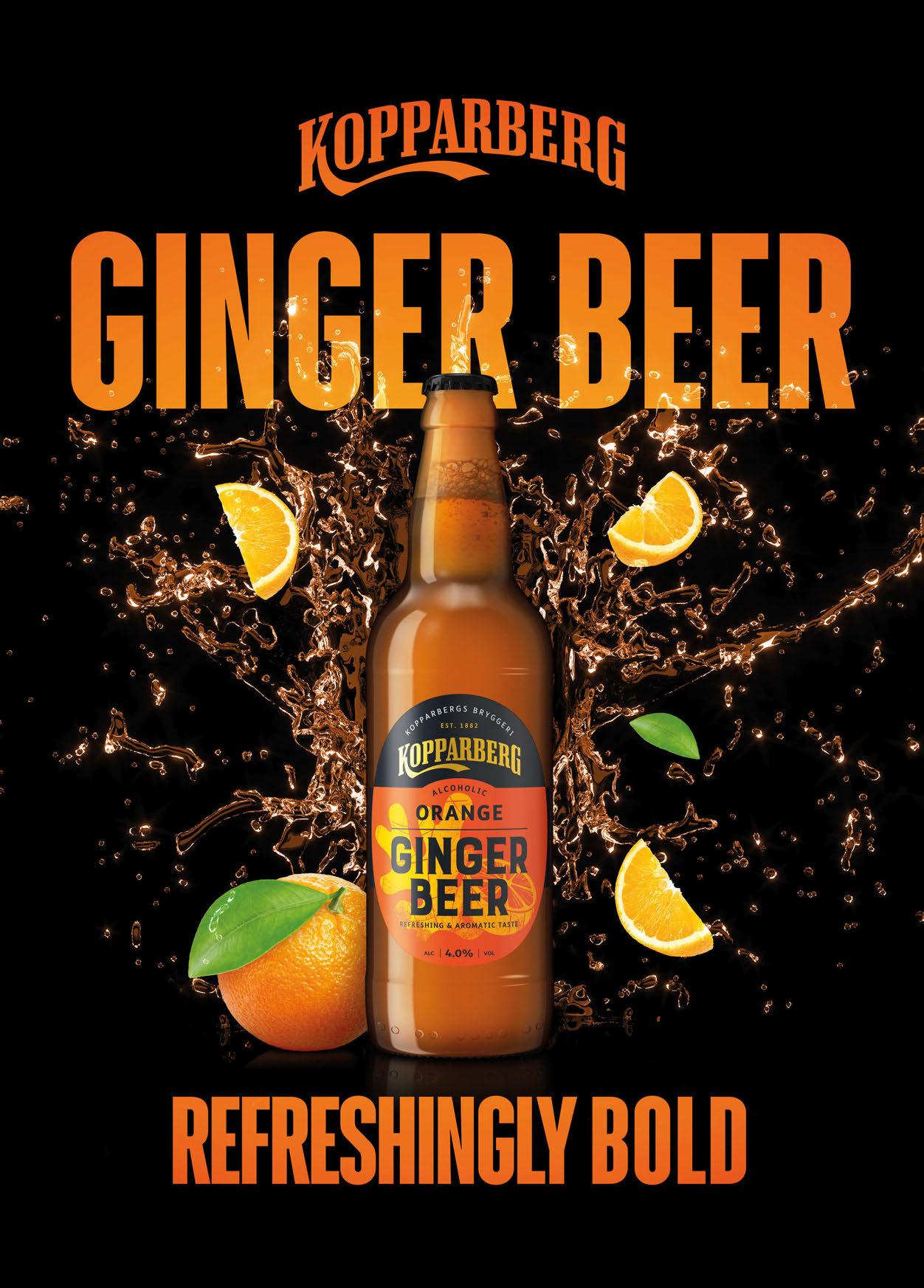
tropical fruit flavours into a light, crisp, and flavourful drink - ideal for consumers seeking a lower-calorie, refreshing alternative. As the days get longer and the promise of summer approaches, Sunburst ofers a bright and invigorating option that delivers on both taste and quality. Designed to be enjoyed with friends, Sunburst embodies the spirit of good company and relaxation – a drink that brings sunshine to any occasion. Speaking about the launch, Paula Reynolds, marketing manager for West Coast Cooler, said: “Sunburst is an exciting new addition to the West Coast Cooler family. This new flavour blends juicy peach and tropical mango for a refreshingly vibrant tropical taste. We’re proud to introduce something new for our fans to enjoy. We can’t wait for everyone to experience the sparkle of Sunburst.”

Sunburst blends vibrant tropical fruit flavours into a light, crisp, and flavourful drink
Sunburst is now available for distribution across select venues and retail outlets. The new flavour comes in a convenient 250ml can-just like Original and Rosé. For updates, follow West Coast Cooler on Instagram: @westcoastcooler.
A rose by any other name.. Tequila Rose is the original strawberry cream liqueur. Combining tequila with strawberry cream was a bold innovation - exotic, unexpected and delicious. Over twenty years later, Tequila Rose remains the world’s best-selling strawberry cream liqueur and was the inspiration that paved the way for the unique cream liqueurs that have followed. Tequila Rose is a silky smooth pairing of rich strawberry cream and the thrilling bite of tequila. It hits the perfect note every time, whether you prefer sweet or seductive. Fearless or fun. Lush or light-hearted. It’s a timeless and alluring classic. With its elegant design and playful details, Tequila Rose is the “little black
dress” of cream liqueurs. Bold black glass keeps the light out to ensure the freshness and the flavour, while shimmery silver roses and bright pink strawberries make this bottle shine on the shelf. A good clue for when your bottle of Tequila Rose is chilled to perfection is when the roses on the label change from silver to bright pink, ensuring the perfect pour every

time! Enjoy Tequila Rose as an ice cold shot, sip over ice, or if you are feeling adventurous, in a fun cocktail. Check out the website https://tequilarose. com/ for some delicious recipes perfect for sharing this summer.
Turn up the heat this summer with i-Stil38 Pink Vodka. When the sun’s out, the cocktails should be too and nothing says summer like the bold, refreshing splash of i-Stil38 Pink Vodka. i-Stil38 Pink Vodka isn’t just another pretty face. Distilled with care and crafted for versatility, it brings a clean, subtly sweet finish that’s made for mixing. Whether you’re hosting garden parties, or just catching the last rays of the day with friends, it’s the perfect base for drinks that taste as good as they look.
Charged with juicy lemon zest and passion fruit hop aromas, and a refreshing, crisp finish, Fierce Mild has burst onto the rapidly growing Irish low-and-no alcohol scene - a session ale for a summer session that never has to end. A beer defined by addition, not subtraction, Fierce Mild brew things diferently. Unlike most other non-alcoholic beers, they use a specialised yeast that limits fermentation naturally. No need to strip out alcohol or flavour after brewing. Irish-produced from startto-finish and made with the highest

quality ingredients from Origin Green certified suppliers and locally grown grains from sustainable farming practices, Fierce Mild is brewed to keep 100% of its character from the outset. The result? An unapologetically great-tasting non-alcoholic extra pale ale that defies convention, delivers everything you’d expect from a great beer and is anything but ordinary. Like revenge, best served cold. Pouring nationwide in 330ml bottles and on draft. Available wholesale through Classic Drinks Ireland, delivering six-days/week. For all enquiries, contacthello@fiercemild.beer.
Passoã is a passion fruit liqueur with a full-bodied sweetness that brings a twist and burst of zest to the palate. Made with real passion fruit from Brazil, Passoã is unmistakably tickled

red with an intensely stimulating flavour. It is the ideal ingredient for simple mixes, easy to make, drink and share. It is the perfect way to add a little passion to your favourite classic and frozen cocktails, with Passoã there are no boundaries to the delicious drinks you can make. Passoã was created over 30 years ago. Since then, the distinguishing black bottle has become a household name amongst the cocktail novices.
Cocktail parties at home are not complete without it. With an ABV of 20%, Passoã is a great low alcohol option, also when served with tonic water or ginger ale. Or the hero cocktail, our favourite the original Porn Star Martini! Proudly distributed by Barry & Fitzwilliam.
Cointreau’s liqueur bottles are now made from two-thirds recycled glass. Describing the recent brand refresh as the “most momentous of its kind in 140 years,” the company says that both the bottle and the label have been altered. As well as looking to boost its sustainability credentials by using recycled glass, convenience and practicality was also a consideration when redesigning the bottle. The bottle has been made four millimetres taller to facilitate its grip and make it easier to hold. Similarly, the newly textured cap provides better grip for an easier twist-of while simulating the skin of an orange. However, the bottle still displays traditional design features such as the Cointreau medallion.
Cointreau is the cornerstone of more than 350 internationally renowned cocktails such as the Margarita,

Sidecar and Cosmopolitan. It enhances your cocktails with its perfect balance. Check out cointreau.com for some cocktail ideas.
Refreshing, versatile, and easy to make, it’s no surprise the Margarita is one of the world’s favourite cocktails. Created in 1948 by Margaret Sames, the original recipe is simple and has remained unchanged since the beginning: Cointreau, tequila blanco, fresh lime juice, and a saltrim. In fact, Cointreau and the Margarita are so inseparable that Sames famously proclaimed, ‘A Margarita without Cointreau is not worth its salt’. Proudly distributed by Barry & Fitzwilliam.
In 2025, Disaronno celebrates 500 years of the world’s favourite Italian liqueur. Disaronno Originale has been delighting palates for centuries, and 2025 marks a significant milestone in its history.

Originating in Saronno, Italy, Disaronno’s secret recipe dates back to 1525, when artist Bernardino Luini, a student of Leonardo da Vinci, was commissioned to paint a fresco in Saronno. Inspired by a local innkeeper, his muse, she gifted him a fragrant amber liqueur - the origin of Disaronno. Passed down through generations, Domenico Reina established the brand in the early 1900s. The iconic square cap bottle, handcrafted in Murano, Venice, is celebrated as a masterpiece of Italian craftsmanship and a global symbol of Italian style and was once displayed at the Louvre in Paris.
Disaronno enhances the pleasure of sharing moments together, reflecting a uniquely Italian way of living. The
rich taste and elegance of Disaronno Originale make it a versatile liqueur that can be enjoyed on the rocks or to create a delicious variety of craft cocktails such as a refined Disaronno Sour or a refreshing Disaronno Spritz. A modern addition to the heritage of the brand, Disaronno Velvet delivers an all-white, silky smooth texture and persistent floral and fruity fragrance that is perfect over ice for a unique and fresh taste or can be mixed to enhance your favourite cocktail with its refreshingly smooth taste. Get creative this summer and celebrate five centuries of Disaronno with cocktails that inspire the endless Dolce Vita. Disaronno is proudly distributed by Barry & Fitzwilliam.
Kylie Minogue Wines is an elegant portfolio of bespoke wines, crafted with passion and integrity, perfect for every occasion. Launched in 2020 on Kylie’s birthday, 28 May, the rosé quickly became one of the most successful launches in its category ever. Kylie Minogue Wines has evolved into a worldwide phenomenon with a glass of Kylie Minogue Prosecco Rosé sold every six seconds. [source: Nielsen EPOS volume sales-Total UK Of Trade to 11th March 2023].

Kylie Minogue Wines has sold 9 million bottles since launch (that’s over 43 million glasses of Kylie Minogue Wine poured) and is available to purchase in 32 countries.
Kylie Minogue now has five rosés in her wine portfolio - Sparkling
Prosecco Spumante, Sparkling Prosecco Frizzante, Cotes des Provence, Signature Rosé and 0% Alcohol Sparkling Rosé. This Signature range comprises of two wines from France including the delicate pale-dry rosé made from Carignan, Grenache & Cinsualt grapes, a light and zesty Sauvignon Blanc from Côtesde Thau.
Kylie 0% Alcohol Sparkling Blanc is is an elegant non-alcoholic Sparkling with delicate notes of jasmine and a refined finish, ofering a sophisticated and refreshing experience for any occasion. Produced with premium European grapes and hand-picked green tea from the Liu-Da Mountains of Yunnan. The innovative fermentation method reduces sugars by up to 30%, generates no alcohol yet delivers all the subtle flavours and characteristics of a traditionally fermented wine. Kylie Minogue Wines are distributed by Barry & Fitzwilliam.
Outcider is giving consumers more options this summer with the launch of two new pack formats into Ireland’s of trade. The new cans come in 4x440ml and 10x440ml packs and will be available across major retailers including Tesco, Dunnes, Supervalu, Centra, Circle K, Eurospar, Spar, Londis and Mace as well as of-licences in the coming weeks.
Outcider ofers a refreshing take on traditional cider with a fresh and


of a
intense apple flavour. The cider is double filtered to ensure a crisp, refreshing taste which has the perfect blend of bitter sweet apple notes and is proving popular amongst younger cider drinkers.
Mario Ilha, channel marketing manager for Outcider, said: “With summer and festival season around the corner it is fantastic to have two new pack formats in several leading stores throughout Ireland. Outcider continues to perform really well here so to be able to give consumers a greater choice is important to us, especially in time for summer.”
To celebrate the launch, Outcider is kicking of a six-figure campaign that will support retailers across Ireland and Northern Ireland this summer and includes in-store and retail media, digital media, competitions as well as gift with purchase featuring an Outcider phone pop-socket.
The new packs will be available in Republic of Ireland and Northern Ireland, where it has the highest rate of sale of all ciders.
Limavady Single Malt Honoured at San Francisco World Spirits Competition with double gold and a place in the best in class finals. Limavady Single Malt Irish Whiskey has received critical acclaim at the 2025 San Francisco World Spirits Competition (SFWSC), highlighting the brand’s commitment to quality, innovation, and heritage.
Crafted by industry veteran Darryl McNally, Limavady is a single-barrel, single-malt expression aged in exbourbon barrels and finished in Pedro Ximénez sherry casks. The whiskey’s




rich flavour profile, featuring notes of dried fruit, mint, and candied spice— earned high praise from the SFWSC’s panel of global experts. McNally, who relaunched the historic Limavady name, also announced that planning permission has been granted for a new distillery in Limavady, marking the return of whiskey production to its ancestral roots in Northern Ireland. “It’s an honour to represent Limavady’s past while shaping its future, We’re so proud of our double gold award and excited to meet the other best in class finalists at the event in November,” McNally said. “This recognition is a milestone for our team and the region. Limavady is poised to become a leader in the new wave of premium Irish whiskey.
Outwalker Irish Whiskey is a modern spirit for independent palates and lands another gold at the San Francisco Spirit Awards. Outwalker Irish Whiskey is the latest premium entrant into the revitalised Irish whiskey scene, a brand built around bold flavour and even bolder identity. Designed for the next generation of whiskey drinkers, Outwalker is distilled and matured in Ireland, drawing on traditional techniques while embracing modern flavour innovation. The result is a spirit that’s smooth yet layered, with a refined oak backbone, a touch of spice, and a clean, confident finish. Positioned as a whiskey for


Outwalker is actively expanding its presence across Ireland, the UK, and beyond, with international distribution in development as it celebrates another gold at the San Francisco Spirit Awards

independent thinkers and adventurous drinkers, Outwalker is actively expanding its presence across Ireland, the UK, and beyond, with international distribution in development. The brand’s mission is to redefine what Irish whiskey can be - not just a product, but a mindset. “Outwalker represents a new voice in Irish whiskey - contemporary, crafted, and unapologetically individual,” said cofounder Jillian Vose. With growing momentum and a distinctive voice, Outwalker is one to watch in the evolving premium spirits category.
For years, whiskey has been boxed in as a fireside sipper, but Fercullen Irish Whiskey is helping rewrite that narrative - one glass at a time. As the summer season stirs a craving for refreshing, complex drinks, whiskey is stepping confidently into the spotlight. And there’s no better ambassador for this spirited revolution than Fercullen 15-Year-Old, recently crowned World’s Best Grain at the prestigious World Whiskies Awards. Crafted by the

Fercullen 15 can be served neat, on the rocks, or as the base of a summer cocktail
skilled team at Powerscourt Distillery, Fercullen 15 is a masterclass in smooth, layered elegance. Its rich vanilla, soft spice, and honeyed grain character

shine equally well served neat, on the rocks, or as the base of a summer cocktail. In fact, its creamy finish and refined balance make it a standout in highballs, whiskey sours, or even a bold take on a whiskey spritz.
Summer drinking is all about versatility and experience and Fercullen delivers on both fronts.
Whether enjoyed in a tall glass on a summer’s day, paired with grilled seafood at a garden party, or stirred slowly into a late-evening old fashioned, it proves that great whiskey isn’t limited by season. The rising interest in lighter whiskey expressions and creative serves is no coincidence. Fercullen 15 and the entire Fercullen range of whiskeys are available through Barry and Fitzwilliam or directly from Powerscourt Distillery.
WKD Cherry Ice brings cool cherry vibes to the Irish RTD market. WKD is setting the tone for a summer of flavour with the launch of WKD Cherry Ice, the latest addition to its iconic line-up. Hitting the shelves from May 2025, Cherry Ice is crafted to deliver a unique and refreshing cherry experience, all with that signature WKD twist. Inspired by the explosive growth of cherry flavours across soft drinks, spirits and RTDs, WKD Cherry Ice brings a frosty, fruity flavour that is designed to resonate with the core 18 to 24-year-old target audience. Delivering both newness and excitement, the variant is set to appeal to loyal WKD fans and attract new consumers seeking something vibrant and on-trend this summer.
WKD Cherry Ice will be available in 70cl bottles (standard and price-

marked packs) and in 330 ml cans, which will also feature in WKD’s popular mixed 10-pack format.
Scott Bell, head of marketing at SHS Drinks, said: “Cherry Ice is WKD at its best– fun, bold and full of flavour. With cherry trending strongly across categories, we have created something cool and exciting that we know WKD fans, and future fans, will love. It is the perfect launch for summer.”
WKD Cherry Ice will be available across retail and convenience channels in Ireland from May 2025, with in-store activations and digital campaigns supporting the launch to drive awareness and trial.
This summer, Smirnof, the world’s No.1 vodka brand*, is taking centre stage and bringing a refreshing taste to music festivals across Ireland. With the launch of Smirnof Sound Nation, the brand is ensuring equal access to incredible music experiences for all. Across the festival season, Smirnof will be unlocking exclusive access to sold-out gigs, installing lowered bars and accessible ramps, creating


WKD Cherry Ice will be available across retail and convenience channels in Ireland from May 2025
dedicated viewing platforms, and introducing braille menus-ensuring that every music lover can join the celebration. Festivalgoers can catch Smirnof at a host of events, including Forbidden Fruit, All Together Now and Electric Picnic festivals, and over 100 more across Ireland. With music, culture, and great drinks coming together, it’s the ultimate way to kick of the festival season with Smirnof So, this summer, get your tickets, grab the serve of the summer, a Smirnof Passionfruit Martini, and let the good times flow.
*Spirits Business, Brand Champions Report 2024
Finlandia Vodka has unveiled a new global campaign as it seeks to connect with a younger adult audience in Ireland and Northern Ireland, by tapping into the cultural shift towards more mindful and values-driven alcohol consumption.
Drawing on the insight from The Future Laboratory, that a younger generation, as an antidote to the ‘cult of busyness’, are increasingly craving their own time and space to indulge in pleasure without pressure, the “It’s Soooooo Fine” tagline has been developed to have dual meaning. The campaign celebrates both how Finlandia can facilitate those easygoing moments of pleasure and the unique character of the drink – the only vodka that’s easy on the tongue and made silky-smooth by Finland’s ‘Midnight Sun’.

The new campaign celebrates how Finlandia can facilitate those easygoing moments of pleasure with the unique character of the drink
Developed in partnership with DDB Paris, the playful campaign encapsulates a world filled with warmth, colour and character, with pleasure at the heart of the story.
The creative features a range of kooky characters enjoying the versatility of vodka (not a nightclub or bar in sight), inviting them to a world where there are ‘no guilty pleasures, only wrong crowds’, encouraging the audience to carve out moments of pleasure in their own unique way – for example ‘put gummy bears in their vodka’ – “It’s “Soooooo Fine.”
Finlandia’s 360-degree marketing campaign rolls out across multiple channels in June across Ireland and Northern Ireland, and includes digital, social media and on/of trade activations. The campaign will be rolled out in multiple countries worldwide. n

Drinks companies are more and more concerned about their sustainability credentials and realise that real action must be taken, in order to ensure the longevity of the industry and the planet. Drinks Industry Ireland reports
From craft distilleries nestled in the hills of Connemara to iconic breweries in the heart of Dublin, Ireland’s drinks industry is undergoing a quiet revolution. As global demand for environmentally conscious products grows, Irish producers are embracing sustainability not just as a trend, but as a core value. Driven by a mix of tradition, innovation, and necessity, the industry is reimagining everything from water usage and energy efciency to packaging and supply chains. This feature explores how some of Ireland’s most beloved drinks brands—and the emerging players challenging the status quo—are working to ensure that every pour comes with a lighter environmental footprint.
Britvic Ireland launches Aqua Libra Still and Sparkling Cans. A commitment to sustainability is at the heart of its strategy and the company strives for its vision of a world where great packaging never becomes waste. This year Britvic Ireland will celebrate 10 years of Origin Green membership and during that time significant progress has been made in packaging sustainability including 56% average recycled content in PET bottles, the implementation of a national Deposit Return Scheme supporting

Britvic strives for its vision of a world where great packaging never becomes waste

packaging circularity and portfolio expansion. Progress is particularly well demonstrated in the water portfolio. The iconic Ballygowan Natural Mineral Water and Hint of Fruit range is available in a range of fully recyclable options: 100% PET, glass and refillable watercooler bottles. Bottled at source in Newcastlewest, Co Limerick, in a site
which has achieved a 99% reduction in direct emissions since 2017.
Recently, Britvic Ireland has launched Aqua Libra finely filtered water. Aqua Libra ofers a range of sustainable hydration solutions and the brand has committed to never using plastic in its primary packaging. Aqua Libra’s core portfolio is a range of premium filter taps which serve chilled, sparkling, boiling and even flavoured water at the touch of a button. In February, Aqua Libra launched finely filtered Still and Sparkling in a can designed to appeal to consumers seeking pure hydration on-the-go who actively reject plastic packaging.
Rye River Brewing Company, based in Celbridge Co. Kildare, has signed a one-year Corporate Power Purchase Agreement (CPPA) with Pinergy, the energy transition company. This agreement will enable the brewery to power its entire operation using renewable energy sourced from Beale Hill wind farm in Listowel Co. Kerry. The initiative is among the first of such contracts to be put in place for an indigenous Irish owned craft brewery committed to sustainable energy and environmental practices. The CPPA forms part of Pinergy’s Guarantee of Origin ofering, which allows companies to purchase electricity generated from wind or solar farms based in Ireland that is feeding in to the national grid.
With this agreement, Rye River Brewing Company joins a growing number of forward-thinking Irish businesses embracing sustainable energy solutions.
This CPPA will meet 100% of the brewery’s annual energy requirements, significantly reducing its carbon footprint and bolstering its commitment to environmental responsibility.
This move to renewable energy will significantly reduce Rye River Brewing Company’s carbon footprint, the equivalent of up to 222.5 flights from Dublin to New York annually.

corporate power purchase agreements for more than 220GWh of annual Irish wind generation under its Guarantee of Origin ofering with demand expected to increase substantially in the coming years as more companies look to reduce their carbon footprint.
Villa Maria is actively progressing a number of sustainability initiatives such as lightweight glass, new can formats for the UK. Their aim is to reach net zero emission in the production of its wine by 2050 (at least). Steps they’ve already taken toward their net zero goal are changing the way they ship wine to its biggest market. They now bottle a selection of their wines locally in the UK market, reducing the carbon emissions for each wine shipment by 27% and conservatively at least 2000 tCO2e per annum.
Their bottles are made from an average

Commenting on the Power Purchase Agreement, Tom Cronin, founder & CEO of Rye River Brewing Company, said, “We are very proud of the fact that by partnering with Pinergy, every KW of energy coming in to Rye River Brewing Company comes from Beale Hill windfarm in Kerry, generating green and renewable energy”.
“Sustainability energy creates very little to no carbon emissions and ofsets our need for fossil fuels. The transition to a sustainable energy system is crucial for mitigating climate change and creating a more sustainable future”. Rye River Brewing Company’s commitment to sustainability has been at the forefront of the business for a number of years. They have invested approximately €5 million in enhancing efciency at their brewery, reducing water usage by over 25% in recent years and electricity consumption by 15% since 2018. Rye River Brewing Co. has also recently partnered with Pinergy to utilise their energy management system, Acutrace, which provides clear visibility of exactly where and when energy and other utilities such as water, are used and what it costs, empowering Rye River Brewing Co. to make data-driven decisions and further optimise their energy and water consumption.”
To date, Pinergy has secured
of 67% recycled glass. Higher recycled content means less energy and carbon emissions to produce. They recently launched Villa Maria can’s in the UK. Villa Maria cans are bottled in market, significantly reducing carbon emissions. Additionally, aluminum cans are infinitely recyclable. The company work hard so that its consumers can recycle their bottles, as every tonne of glass recycled saves approximately 670 kg of CO2 compared to using raw materials.
Repak, Ireland’s national packaging compliance scheme, has provided support to members for over 25 years on all aspects of packaging recycling and compliance. As regulations arising out of the EU Packaging and Packaging Waste Regulation (PPWR) come into efect and Ireland faces ambitious recycling target sin 2025 and 2030, membership of Repak is a must, to ensure compliance and provide advice and support to Irish retailers.
Repak membership provides crucial support and guidance to navigate complete compliance, ofering practical help and resources to understand

exactly how your business can meet its legal obligations for packaging waste recovery and recycling in Ireland. This includes access to reporting tools, how-to guides, workshops, access to PPWR compliance experts, and clear breakdowns of legal requirements.
Repak also ofers expert packaging advice, helping you choose options that are not only compliant but also efcient for your operations–potentially reducing waste and costs. Mark Hayden, head of Membership Services, puts it clearly: “Our primary goal is to simplify the compliance journey for our members, providing them with the tools and expertise needed to operate responsibly and efciently within the evolving regulatory framework.
“Members get support on designing packaging for reuse or recycling and advice on optimising packaging strategies – essential for managing waste efectively and meeting customer expectations for sustainability”. Through advocacy at both national and EU governmental levels, Repak actively represents its members’ interests in discussions concerning evolving regulatory frameworks such as the PPWR.
As packaging legislation evolves, Repak membership ofers Irish retailers and grocers an invaluable partnership. It delivers straightforward compliance support, expert guidance on packaging choices, essential resources, strong representation and advocacy at National & EU governmental level.
Repak membership ofers a powerful partnership. It provides focused compliance support, expert advice, essential tools, and a collective voice. Joining Repak helps your retail business confidently meet today’s challenges and prepares you for a more sustainable and competitive future. To discuss the benefits of joining over 3,500 leading retail members, from local shops to major brands, and to learn more about Repak membership contact our dedicated membership team atmembership@repak.ie.
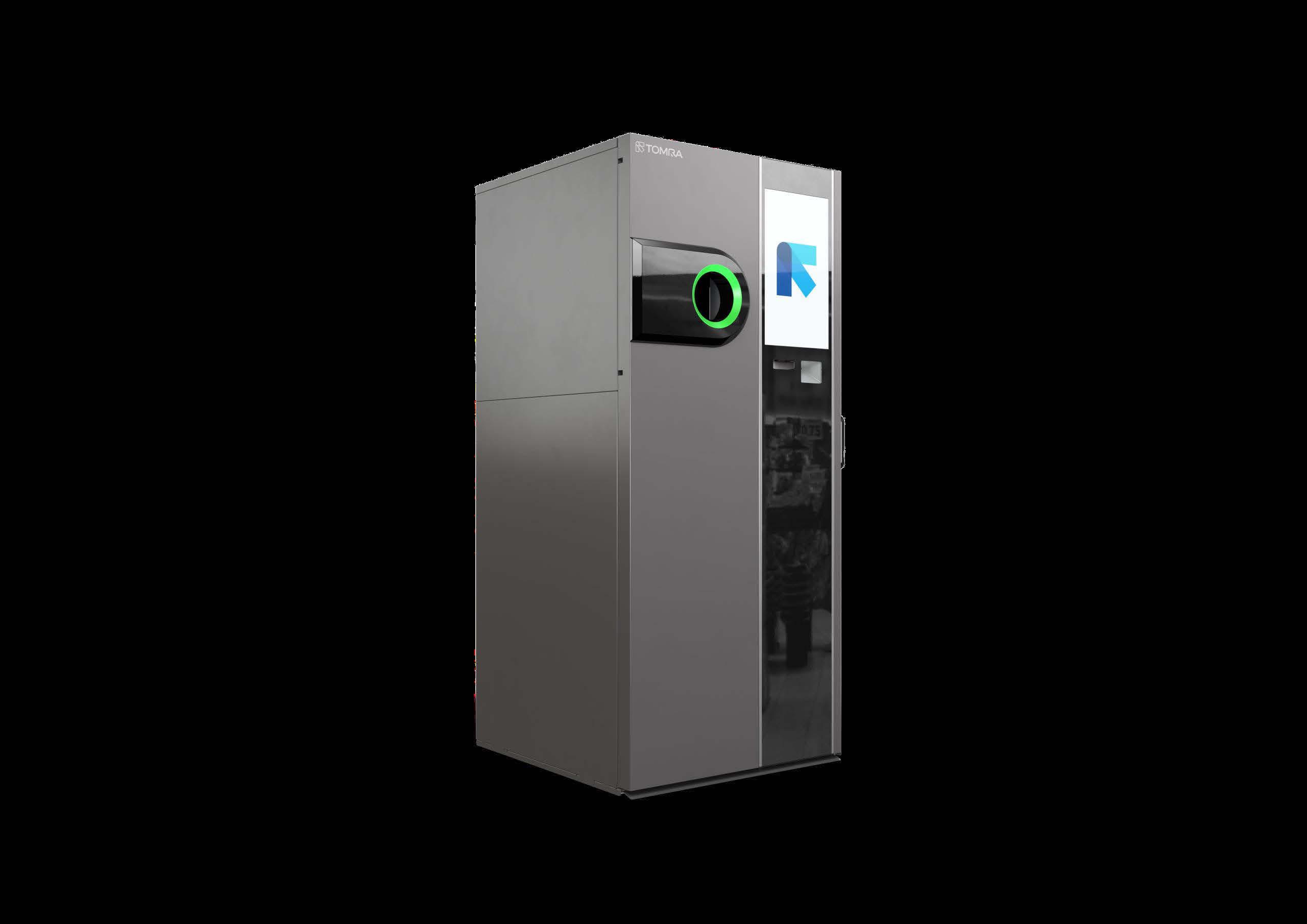
Lambay Whiskey opens first-ofits-kind ofshore, of-grid island distillery
Since its founding in 2017, the aim of Lambay Whiskey, which is currently sold in 30 markets worldwide, is to contribute to the conservation of the Natura 2000-designated island
Lambay Whiskey, a partnership between the Baring Family and worldrenowned Cognac producer House of Camus, has ofcially opened a first-ofits-kind ofshore, of-grid island microdistillery.
This distillery is not just about crafting exceptional whiskey; it is about ensuring a future for Lambay Island, one of Ireland’s natural treasures, as Cyril Camus, president of House of Camus explains.
Cyril Camus, president of the French cognac company House of Camus, and Alex Baring, Lambay Island’s custodian and resident, mark the ofcial opening of the first of its kind ofshore, of-grid island whiskey distillery on Lambay Island, of the Dublin coast.
“In a world that too often sacrifices the environment for production, we have chosen a diferent path.
“Together with Alex Baring, we have reimagined what a distillery can be. This is not just a commercial operation; its fundamental objective is to contribute to the preservation of the environment and the heritage that surrounds it.
“Our vision was always to protect this beautiful island and to do it by creating an exceptional whiskey, ensuring both can be enjoyed for generations to come.”
Just three miles from Dublin’s coast, Lambay Island is a private wildlife sanctuary and home to a rare ecosystem of grey seals, wallabies, seabirds, and a medieval castle. Owned by the Baring family since 1904, the island has long been a haven for biodiversity and historical preservation.
Since its founding in 2017, the aim of Lambay Whiskey, which is currently sold in 30 markets worldwide, is to contribute to the conservation of the Natura 2000-designated island.
The distillery will only operate in the winter months due to the of-grid nature of the Island.
Lambay Whiskey’s distillery manager, Seamus Curtin, will oversee the distillery and live on the island for six months each year.
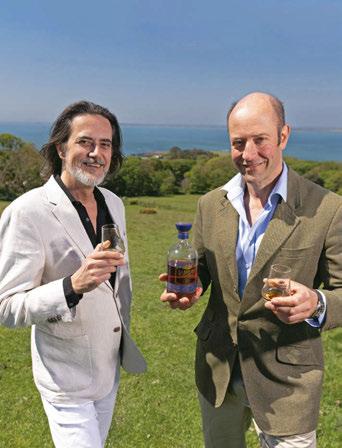
Cyril Camus, president of the French cognac company House of Camus, and Alex Baring, Lambay Island’s custodian and resident, mark the ofcial opening of the first of its kind ofshore, of-grid island whiskey distillery on Lambay Island, of the Dublin coast
He explains how bringing this project to life was not an easy task: “Transporting a distillery, piece by piece, to a remote island was no small feat, especially with very few boats in Ireland capable of the job and weather delays at every turn.
“I am immensely proud the distillery is now up and running and I feel incredibly fortunate that I get to live and work on such a remarkable island, crafting a truly special whiskey,” he said.
Built as a circular, closed-loop system, the distillery reuses resources and minimises waste, setting a new path for sustainable whiskey production. As the island has no mains power, the distillery will be powered initially by HVO, a clean-burning diesel alternative and is working to eventually transition to full energy independence using solar, wind and wave power.
Excess heat generated through production will warm the nearby 15th century castle. Organic Irish grain will be used in the whiskey-making process, with by-products recycled into feed for island animals.
This eliminates the need for imports, further reducing the island’s carbon footprint.
The distillery will produce the highest-quality single malt whiskey which, once distilled, will mature in the island’s Sea Cask Room for at least three years.
The Irish spirits industry is increasingly embracing sustainability—but that wasn’t always the case. When Michelle and Gareth McAllister set out to establish their new distillery in the West of Ireland, they were among the few whiskey and gin makers committed to sustainable practices in producing quality Irish spirits. “As a family, we already supported those values”, explains Michelle. “So, when it came to building a distillery, we knew sustainability had to be at the heart of it. It wasn’t the easiest or cheapest routebut it was the right one.”
That route led them to the village of Ahascragh in East Co. Galway, where they opened Ahascragh Distillery two years ago. It’s a facility that is now proudly recognised as Ireland’s first zero-energy emissions distillery. Housed in a restored 19th-century flourmill that the couple transformed into a state-of-the-art facility, Ahascragh Distillery is powered entirely by renewable energy, primarily wind and solar. It uses high-temperature heat pumps, thermal storage and advanced heat recovery systems to operate without burning fossil fuels. As a result, flue emissions are eliminated and energy consumption is drastically reduced. Water usage is also meticulously monitored with the distillery’s own sourced water from two on-site wells.
Currently, Ahascragh’s award-winning XinGin is distilled and bottled on site, with award winning Clan Colla whiskey matured, finished, blended and bottled on-site. In under two years, they will release their Ahascragh-distilled whiskey, fully matured and100% sustainably produced. “This will be the first Irish

Ahascragh is Ireland’s First ZeroEnergy Emissions Distillery
whiskey created entirely through a zero energy emissions process, from milling, mashing, right through to distillation”, says Gareth. The distillery’s innovative work has been recognised with the SEAI’s Innovative Deployment of Renewable Energy Award, the EU Foodies Winner of the Greener Planet Award, Spirits Business Sustainable Distillery Winner, and Origin Green. n
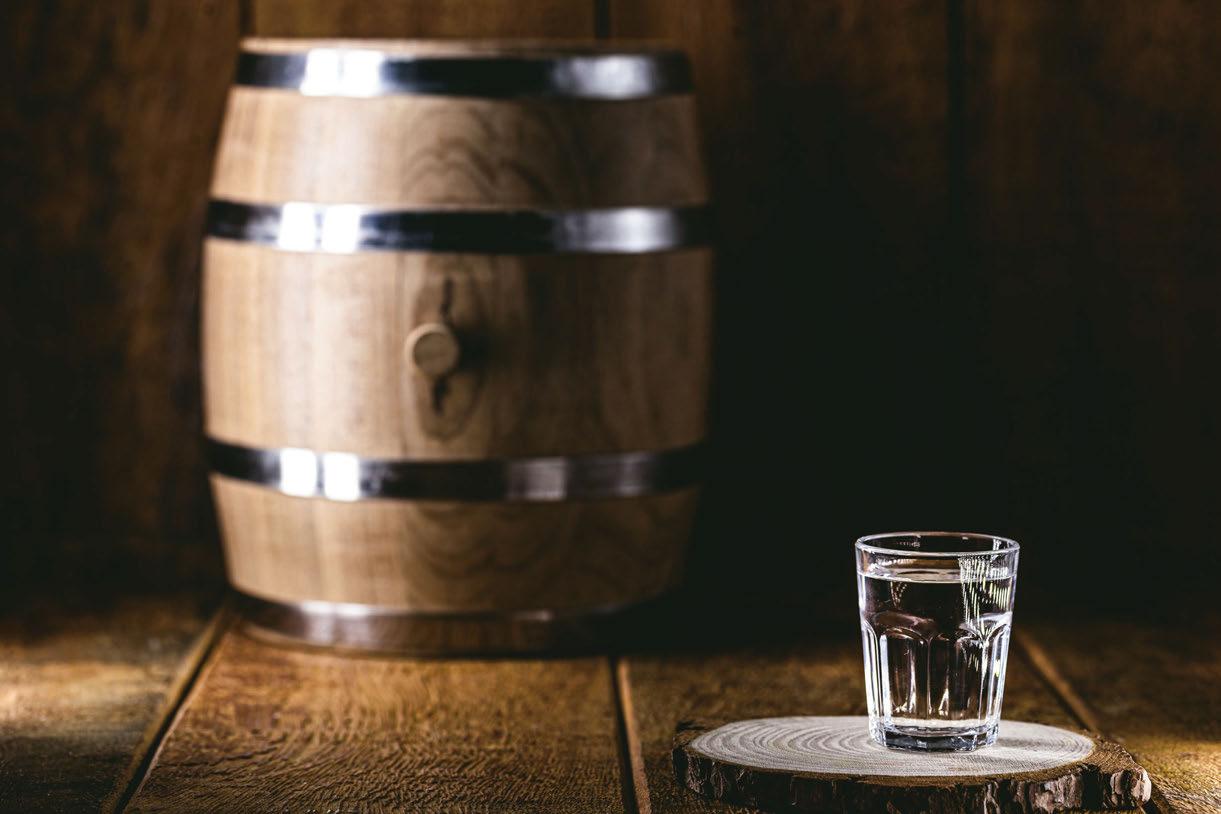
Poitín has become something of a prestige product, now widely available on the shelves of the top cocktail bars and upmarket hotels across the country and is a mainstay on cocktail menus everywhere. It injects a bit of homegrown fun into classic drinks and captures the charm of the Irish spirit! Drinks Industry Ireland looks at which products are keeping the poitín category fresh
Once synonymous with secrecy and rebellion, and often dubbed Ireland’s original spirit, Poitín is emerging from the shadows of history into the spotlight of a modern, global drinks market. Traditionally distilled in remote cottages and mountain stills, this once-illegal spirit was long viewed as a relic of the past, associated more with folklore than fine spirits. But today, poitín is undergoing a renaissance. With a growing number of craft distillers championing its revival, the spirit is being reimagined for a new generation of consumers who value authenticity, heritage, and bold flavours.
Distillers are drawing on centuries-old techniques while refining production to
meet the standards of contemporary palates and international markets. As global interest in niche and culturally rich spirits expands from mezcal to baijiu, poitín is poised to join the conversation, ofering something uniquely Irish to a world eager for storytelling in a bottle. We look at how poitín is reclaiming its place in the Irish drinks industry and setting its sights far beyond the Emerald Isle.
The original Irish spirit, reimagined
Before whiskey, there was poitínIreland’s first and most rebellious spirit. Born in monastic stills like those at Glendalough in the 6th century and outlawed in 1661, poitín is the true forefather of Irish whiskey.

Today, Glendalough Distillery revives this ancient craft with a bold, modern expression that blends heritage with innovation. Glendalough Poitín is triple-distilled in traditional copper pot stills using malted barley and pure spring water. Bottled at 55% ABV, it delivers an unapologetically fullstrength, authentic taste of Ireland’s original spirit. On the nose, it’s rich and aromatic, with sultanas, mango, and orange zest. The palate is lively and rounded, revealing layers of dark cherry, plum, vanilla, and cracked pepper. A warming finish brings oak spice and a gentle nuttiness, thanks in part to a rare short finish in virgin Irish oak casks - adding depth without masking its character.
Smooth yet spirited, this small-batch poitín is as versatile as it is historic. It’s perfect sipped neat or on the rocks, and equally at home in bold contemporary cocktails or creative twists on classics. Winner of Gold at the Irish Whiskey Awards (Poitín Category), Glendalough is arguably the benchmark for modern poitín—a premium, heritage-led spirit with real back-bar presence. For any venue looking to showcase Ireland’s native distilling craft, Glendalough Poitín is a must-have.
Micil Distillery was named in honour of the owner’s great great great grandfather, Micil Mac Chearra, who began distilling poitín in 1848 on a Connemara hillside. For six generations and over 170 years the family has preserved this craft, distilling extraordinary spirits on small copper stills using family recipes, inherited knowledge, and time honoured techniques.
Today, they ofer two core poitíns that stay true to tradition while opening up new possibilities behind the bar. The Classic Poitín, made from 100% malted barley, is unpeated and smooth, making it ideal for lighter, brighter serves. The Heritage Poitín, with a mash bill of 80% malted barley and 20% peated oats, brings a rich, smoky complexity. Both are distilled with wild Connemara bogbean, a native botanical they harvest by hand on their own land. Micil Poitíns are the perfect Irish substitute for agave based spirits. Think Irish margaritas, known as a Nóiníns, made with classic Poitín, or smoky palomas made using their
Heritage expression.
Each year, they also release small batches of single cask poitíns, rested in unique barrels for up to 10 weeks to explore new flavours while staying rooted in tradition. Discover more about our Poitín range at https://micildistillery.com
Raise a glass to the wild spirit of Ireland–Straw Boys Poitín. In the windswept west of Ireland, mischief and merriment often arrive unannounced and nowhere is that more delightfully embodied than in the tradition of the Straw Boys. Masked in towering conical hats woven from straw, these spirited wedding crashers would burst into celebrations, dance with the newlyweds, share a toast, and vanish in the night, leaving only laughter (and empty bottles!) in their wake. At Connacht Distillery, they celebrate this rich heritage with Straw Boys Poitín, a tribute to joy, spontaneity, and the unruly magic of Irish tradition. Historically outlawed and often misunderstood, Poitín is Ireland’s original spirit - bold, untamed, and unapologetically potent. But Straw Boys Poitín brings refinement to this rebellious classic. Bottled at a smooth 45% ABV, it’s a gentler take on a fiercetradition—still wild at heart, but with elegance in every sip.

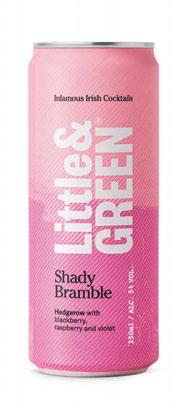

A range of premium, ready to drink canned cocktails ofering flavorful, modern twists on infamous Irish classics in a convenient format
Little & Green is a flavorful expression of contemporary Irish culture. A celebration of what it is to be Irish, ready for a good time, any time. Little & Green embraces the past to inform the future, providing the opportunity for a new generation to experience, to share and to love poitín. They produce a range of premium, ready to drink canned cocktails ofering flavorful, modern twists on infamous Irish classics in a convenient format. Crafted with care by Ireland’s best bartenders to showcase the quality, flexibility and versatility of the original Irish spirit.
Made with two of Ireland’s leading poitín brands, Mad March Hare and Bán, with recipes created by the mixology team at Bar 1661-Ireland’s 2023 Bar of the Year-the range launched in 2023 with a pair of delicious sparkling cocktails. Sneaky Orchard is a refreshing take on the Collins, a harvest festival of ripe pear, crisp apple, and elderflower. Shady Bramble is inspired by Ireland’s deep, dense hedgerows, bursting with flavours of wild juicy blackberry, raspberry, and violet.
Little & Green is proud to be blazing a trail with the world’s first poitín canned cocktails. They contain no artificial sweeteners and are vegan and gluten free with an ABV of 5%. Distributed by Intrepid Spirits, Little & Green is available at Tesco, Dunnes Stores and select Independent retailers across Ireland. For more details checkout www.littleandgreen.ie. and follow@littleandgreen.ie__onInstagram
In the windswept west of Ireland, mischief and merriment ofen arrive unannounced and nowhere is that more delightfully embodied than in the tradition of the Straw Boys. Masked in towering conical hats woven from straw, these spirited wedding crashers would burst into celebrations, dance with the newlyweds, share a toast, and vanish in the night, leaving only laughter (and empty bottles!) in their wake.
Mad March Hare embodies the essence of Irish craftsmanship and the shared pride in our collective heritage. As Ireland’s and the world’s-leading Poitín brand, the multi-award winning Mad March Hare has earned a reputation for its uncompromising commitment to quality and authenticity. Crafted with locally sourced malted and unmalted barley then cut with pure Irish spring water, this poitín is distilled three times in small copper pot stills to produce a flavorful spirit that’s exceptionally smooth yet retains incredible character.
Mad March Hare is on a mission to resurrect the poitín category. Their goal is to ensure that the spirit of Ireland remains alive and thriving for generations to come, around the world but first and foremost of course, across Ireland. The undeniable upswing in the presence of this storied category across our country has been fueled by Irish mixologists embracing poitín’s unique flavor characteristics, versatility and of course its undeniably real Irishness!
After 300 years of existing in the shadows, it’s wonderful to see poitín increasingly take centre stage on cocktail menus and mixed drinks across the country! Mad March Hare has been at the forefront of that recent revival, injecting poitín into Ireland’s key tourism strongholds. Core to the revival has been re-engaging the on premise via their Irish
Poitín Parties! With garden takeovers and bartender nights at An Púcan, The Skef, JT Pim’s and The Rag Trader already this year. This has been key alongside solid menu placements in iconic venues across Ireland including Bar 1661 Dubin, Hilliards Killarney & Paris Texas in Kilkenny.
In order to grow a category, supporting bars like Buddha Bar in Galway and Costigans, Clancy’s & Caskin Cork has been vital to reaching desirable consumers. Whilst in the prestige hotel sector, Mad

March Hare Poitín is now a mainstay on the cocktail menus of The Cashel Palace Hotel, Great Southern Killarney and Mount Juliet. Whether sipped solo, mixed or shaken into a cocktail, Mad March Hare captures perfectly the character and charm of the Irish spirit! Switch things up with an Irish Margarita, a Belfast cofee, Mad March Sour or even as a shot alongside a pint of Irish Stout. Mad March Hare Poitín is owned and distributed by Intrepid Spirits, based in Dublin.
For more information visit www.madmarchharepoitin.com n

Boann Distillery in Co Meath has claimed a major accolade, receiving a Double Gold medal and 99 points for its Boann Single Pot Still Irish Whiskey – Pedro Ximénez Cask at the San Francisco World Spirits Competition.
This distinction is awarded only to those spirits unanimously rated exceptional by the panel, reinforcing Boann’s position as one of the most innovative and quality-driven producers in the Irish whiskey category.
The SFWSC is the world’s oldest and most respected blind-tasting competition, setting the benchmark for excellence across the global spirits industry.

Boann’s Pedro Ximénez (PX) Cask release now joins an elite cohort of Double Gold recipients, many of whom have gone on to international prominence and market success.

The PX whiskey is one of three Single Pot Still expressions launched by Boann in mid-2024, each showcasing
“We like our products to prove themselves rather than banging the drum in advance”, explains Rick LeVert, managing director and head brewer at Kinnegar.
Jackrabbit has certainly proven itself, gaining a keen reputation both on draught and from the bottle over the Irish winter. As spring arrives, Jackrabbit is now poised to expand its reach in the leaps and bounds typical of this particular member of the rabbit family thanks to some striking new branding created by Irish illustrator Dermot Flynn.
Perfectly balanced against a backdrop of flavours and rounded of with pitch perfect sweetness to an ABV of 4%, Kinnegar’s Jackrabbit can be enjoyed cold from the fridge, topped up with ice and a slice of lime or mixed to great efect in a delicious Irish whiskey cocktail.
RRP €3.99 per 500ml bottle – find Jackrabbit on shelf in O’Brien’s, SuperValu, Molloy’s all good oflicences nationwide. Also available on draught in numerous outlets nationwide.
Redbreast Single Pot Still Irish Whiskey, renowned for its rich heritage, proudly launches its largest national brand campaign yet, ‘Quite the Find,’ in collaboration with BAFTA winner, Golden Globes and Screen Actors Guild nominee, Andrew Scott. The campaign celebrates the joy of uncovering hidden gems - much like the first sip of Redbreast whiskey, it is a journey that reveals unexpected layers of complexity and character. Encouraging audiences across Ireland to dig deeper to unearth something amazing, making the search worthwhile, the campaign also highlights the ‘Redbreast Unhidden’ Award, a short film competition run in
partnership with SXSW that launched earlier this year, which spotlights short film formats, ofering a curated selection of new films and talent.
To kick of the launch, Redbreast has lit up across OOH and digital, debuting a new campaign film starring Scott across the brand’s social channels. The 30-second spot was created in partnership with storytelling powerhouse Merman TV — a production company co-founded by fellow Irish Emmy and BAFTA winner Sharon Horgan.
a unique cask finish - Marsala, Madeira, and Pedro Ximénez - and marking a significant expansion in the distillery’s premium portfolio.
Nearly five years in development, the range represents the essence of Ireland’s native whiskey style: Single Pot Still, a uniquely Irish category which is both exclusive to the island and steeped in tradition.
Located in the Boyne Valley, Boann Distillery is a family-owned operation committed to reshaping the future of Irish spirits. For more information on Boann’s whiskey range, visit: www.boanndistillery.ie
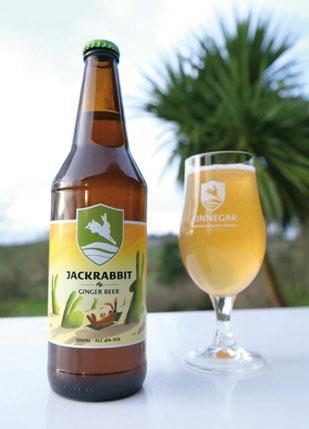
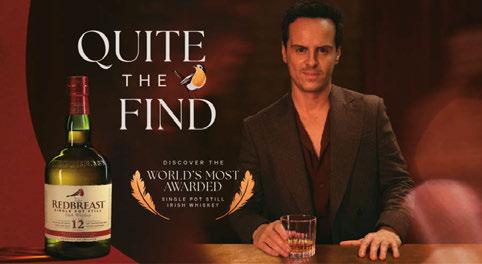
The new brand campaign has gone live across Ireland and will also include a screening event taking place at The Stella Cinema on 11 June, showcasing Scott’s shortlist of SXSW’s short films, and the crowned winning film of the inaugural Redbreast Award, selected by Scott. To learn more please visit www.redbreastwhiskey.com
Graham Norton is no stranger to great wine, but this harvest season he took his passion a step further and joined Invivo Wines’ cofounders Tim Lightbourne and Rob Cameron in Marlborough, New Zealand to craft the latest GN blend.
Graham rolled up his sleeves in the Awatere Valley, getting hands-on with grape picking, tasting juice samples, and assessing fruit quality with his long-term Invivo winemaker partners - an essential step in crafting the next, twelfth, vintage of his GN Sauvignon Blanc.
“New Zealand produces some of the world’s best Sauvignon Blanc, in
Disaronno Day was celebrated on 19 April, a nod to 500 years of the world’s favurite Italian liqueur. Disaronno Originale has been delighting palates for centuries, and 2025 marks a significant milestone in its history. Originating in Saronno, Italy, Disaronno’s secret recipe dates back to 1525, when artist Bernardino Luini, a student of Leonardo da Vinci, was commissioned to paint a fresco in Saronno. Inspired by a local innkeeper, his muse, she gifted him a fragrant amber liqueur – the origin of Disaronno. Passed down through generations, Domenico Reina established the brand in the early 1900s
my opinion. It’s incredible to think that what began as a small, limited-edition run of GN New Zealand Sauvignon Blanc has grown into a global brand. Now, here we are harvesting grapes in Marlborough for our twelfth vintage! I don’t just put my name to the wines - I’m involved in the process, which makes being here in this stunning region for harvest all the more special,” says Norton.

* Nielsen EPOS Total UK Coverage 52wks to 25th Jan 2025
The iconic square cap bottle, handcrafted in Murano, Venice, is celebrated as a masterpiece of Italian craftsmanship and a global symbol of Italian style and was once displayed at the Louvre in Paris.
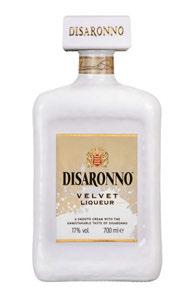

The rich taste and elegance of Disaronno Originale make it a versatile liqueur that can be enjoyed on the rocks or to create a delicious variety of craft cocktails such as a refined Disaronno Sour or a refreshing Disaronno Spritz. A modern addition to the heritage of the brand, Disaronno Velvet delivers an all-white, silky smooth texture and persistent floral and fruity fragrance that is perfect over ice for a unique and fresh taste or can
Bulmers has unveiled a bold new campaign for its non-alcoholic cider, Bulmers 0.0, celebrating golden moments shared with pals, without sacrificing the next morning. Titled ‘Tonight’s Zero, Tomorrow’s Hero’, the nationwide 360-marketing campaign taps into a growing cultural shift. More people are choosing balance: saying yes to midweek drinks, Friday nights out, or post-match pints, while still
wanting to feel fresh the next day. With Bulmers 0.0, they don’t have to compromise. With creative direction from Boys + Girls, the campaign will span TV, out-of-home (OOH), digital, social media,and in-store activations. As demand for alcohol-free options grows, the campaign positions Bulmers 0.0 as the go-to cider for those who want to stay social and stay sharp.

be mixed to enhance your favourite cocktail with its refreshingly smooth taste.
Get creative this Disaronno Day and celebrate five centuries of Disaronno with cocktails that inspire the endless Dolce Vita.
To see Disaronno recipes visit www.disaronno.com

It may be a long way to Tipp but it’s worth it
Tipperary Boutique Distillery has released its latest two whiskeys –Home Grown Barley Single Malt Rioja Cask Mezcal Finish and Home Grown Barley Single Malt Rioja Cask Sake Finish. The company has recently received a Silver Medal for its Single Cask Sake Finish in the Tokyo Whisky & Spirits Competition 2025, which they are extremely proud of.
The Single Malt Rioja CaskMezcal Finish is a lively hit of summer berries intertwined with a kick of black pepper and liquorice. Mixed with water, dried fruits lead the way, followed by pepper, before the return of those summer fruits, finishing with aniseed. It’s an


The company has recently received a Silver Medal for its Single Cask Sake Finish in the Tokyo Whisky & Spirits Competition 2025
The Shed Distillery launches a special 7 year old Drumshanbo Single Pot Still Irish Whiskey Tawny Port Cask Edition. It has taken seven years of slow maturation in premium Tawny Port casks to receive the seal of approval from head distiller, Brian Taft. Every drop has been tripledistilled with malted and un-malted Irish barley, and Irish barra oats at The Shed Distillery of PJ Rigney. Taft intricately manages every step of the distillation process. Since 2018, it has rested in Tawny
Heaven Hill Brands, one of America’s largest independent, family-owned and lead distilled spirits company, has appointed Barry & Fitzwilliam as its exclusive distribution partner in the Republic of Ireland. This strategic partnership marks an important step forward for Heaven Hill Brands as it expands its international footprint and strengthens its commitment to delivering its award-
interesting dram – layered and full of surprises.
The Home Grown Barley Single Malt Rioja Cask - Sake Finish is rich in appearance and pours a deep crimson red. It has a vibrant and full bodied nose reminiscent of blackcurrants and ripe red summer fruits. The aroma evolves with water, drawing out the warm notes of dried fruits. With water, the profile shifts into something darker and spicier: like blackcurrants and dates, whilst black pepper and a subtle hint of chilli add complexity to the spirit.
With an ABV of 50% each, both spirits are now available at a cost of € 119.95 from www.tipperarydistillery.ie or from Celtic Whiskey.
Port casks, carefully selected by Brian and distillery founder PJ Rigney and brought over from Northern Portugal. The Shed Drumshanbo Single Pot Still Irish Whiskey has received a remarkable international response since its inaugural release in 2019 being named one of the top 20 whiskeys in the world by Whiskey Advocate. Distributed by Dalcassian Wines & Spirits, for more information please contact your Dalcassian Representative or our Ofce on 01 293 7977 RRP. €80


winning portfolio to discerning consumers across Ireland. The partnership will see the distribution of key brands including Evan Williams Bourbon, Elijah Craig Small Batch, Rittenhouse Rye, and Lunazul Tequila, bringing some of Heaven Hill’s most celebrated spirits to the Irish market. n


held at The Strand Hotel Limerick on 13 May

Clodagh and Michael O’Donovan with Sharon Walsh from Heineken

VFI CEO Pat Crotty with Michael Farrell from Cork

Noreen O Sullivan from Tipperary and Anna Moynihan from Wicklow at the VFI Gala Dinner

VFI President John Clendennen with his wife Elaine

Pat Rouse from Ballina with Elaine Comerford, VFI and Sean O’Grady, Westport


Martin and Siobhan Gibbons from Letterkenny

Councillor Martin Harley, Alice Lynch and president John Clendennen at the VFI Gala Dinner in Villa Rose Hotel

held at The Guinness Storehouse on 25 March





held at Old Fashioned Sam’s, Dublin 2 on 14 May





held at The Iveagh Garden Hotel, Dublin 2 on 26 April









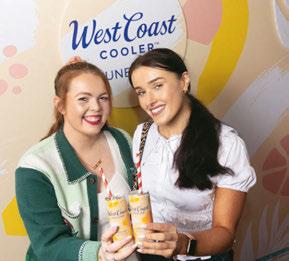
Caroline Reidy, managing director and founder of The HR Suite is a HR and employment law expert. She explains how to manage workplace investigations fairly so as to maintain a positive and dignified work environment for all

Workplace investigations are essential tools for upholding integrity and trust within an organisation. They serve as the backbone for enforcing company policies and ensuring that all employees are treated with respect and fairness. By conducting thorough investigations, companies can address allegations of misconduct efectively, safeguarding both the complainant’s and the accused’s rights.
These investigations play a pivotal role in maintaining a positive and dignified work environment. They ensure that complaints are handled fairly, confidentially, and impartially, providing a structured process to resolve issues.
Managers and employers must adhere to established protocols when managing employee complaints. In cases of a whistleblowing complaint, the identity of the reporting person making the allegation may be kept
confidential so long as it does not hinder or frustrate any investigation. However, the investigation process may reveal the source of the information and the reporting person may need to provide a statement as part of the evidence required. All complaints should be reviewed thoroughly to determine whether they warrant informal resolution or a formal investigation. Under the Code of Practice on Grievance and Disciplinary Procedures, strict confidentiality must be maintained throughout. Where necessary, temporary alternative work arrangements should be organised to reduce potential workplace tensions. Employers and managers should foster an environment where open dialogue and mutual respect are encouraged, helping to build a culture of trust and collaboration.
As outlined in the Dignity at Work guidelines, the HR function is generally responsible for conducting the preliminary screening of complaints. However, a nominated person whether from within or outside the HR team, may also assist with this process, provided they have the necessary training and experience to handle the issue objectively and professionally. This collaborative approach ensures that the investigation is thorough and balanced, leveraging diverse perspectives to maintain fairness.
The decision on who should lead the investigation depends on the nature of the complaint. HR professionals, are often considered neutral parties,
The accused has the right to object to the investigator if concerns arise about potential bias or a conflict of interest
making them well suited to conduct investigations, particularly when multiple departments are implicated. Conversely, when complaints involve highly technical matters or specific industry contexts, a line manager with relevant knowledge may be better equipped to handle the investigation thoroughly. In workplace investigations, it is vital to ensure the process is conducted with the utmost fairness and impartiality applying the rules of natural justice. The accused has the right to object to the investigator if concerns arise about potential bias or a conflict of interest. This is particularly important, as such biases can compromise the integrity of the investigation and the overall trust in the investigative procedures.
The accused has the right to object to the investigator if concerns arise about potential bias or a conflict of interest. In such cases, an alternative investigator should be considered to maintain the investigation’s integrity and ensure that fairness and impartiality are upheld throughout the process.
Under the Employment Equality Acts 1998-2015, maintaining impartiality in workplace investigations is crucial. Therefore, when an objection is raised regarding an investigator’s potential conflict of interest or perceived bias, it is essential for the credibility of the investigation that an alternative investigator is considered. This change can help safeguard the rights of all parties involved and reinforces the commitment of the organisation to uphold ethical standards and legal requirements.
Advance notice of allegation: The rules of natural justice requires that the accused be informed of the allegations against them before the
first meeting. They should be given adequate information and time to prepare a defence.
Use of recording during Investigations: The organisation’s disciplinary procedure should outline the rules for recording disciplinary hearings. If both parties agree, recording can proceed legally.
Support during hearings: According to the Code of Practice on Grievance and Disciplinary Procedures, employees are entitled to representation and may be accompanied by a work colleague or Trade Union representative. Allowing family members to attend is typically at the employer’s discretion.
To handle workplace issues promptly and efectively, managers should receive training in Dignity and Respect at Work, as well as Disciplinary and Investigation procedures. This ensures they have the skills and knowledge to manage situations appropriately and impartially.
E fective workplace investigations

rely on confidentiality, fairness, and procedural adherence. By carefully managing the complaint process and ensuring impartial investigations, organisations can maintain a positive and dignified work environment for all involved. Proper training, transparent communication, and adherence to best practices can
lead to resolutions that uphold the integrity of the workplace and reinforce a culture of respect. If you require further support or advice relating to HR, please do not hesitate to contact us at info@ thehrsuite.com / (066)7102887. For more information visit www.thehrsuite.com or read our blog. n
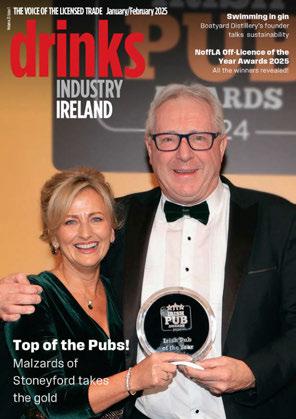




Mourne Dew was founded in 2017 by Donal Farrell, a former barrister and chartered accountant. Fresh from a win at the Irish Food Writers’ Guild Award, he speaks to Drinks Industry Ireland about a typical day in his life
What time do you get up on a week day?
I usually get up around 6.30am and go for a run. I try to hit 200km each month, but this can be difcult to achieve during the dark days of the winter months.
Typical breakfast?
A cup of tea normally does, but on occasion a large fry is good for the soul.
Do you commute or work from home?
The distillery is a 10 minute commute, so it’s almost like working at home.
How long have you been in your current job?
Since 2017.
What does a typical day at work include?
There’s no such thing as a typical day at work for me. When you run a
small business you can end up doing anything. Distilling, blending, bottling and labelling, selling, and devising new recipes are all in a day’s work for me!
Who is your favourite politician and why?
Nye Bevan. Bevan founded the NHS, one of the greatest gifts imaginable to millions of people who would otherwise have been denied health care. Bevan was a true socialist who has a left a legacy that modern politicians can only dream of.
Who is the most annoying celebrity in your opinion?
Anyone who has ever been on “I’m a Celebrity, Get Me Out Of Here”. Mind you I don’t watch the programme so maybe that’s being a bit unfair.
What is the best ad (apart from the brand’s you represent)
The Hamlet Cigars photo booth advert that starred Gregor Fisher.
Worst ad on television?
The “Booking Geniuses” advert for some travel company that is currently running on ITV is cringeworthy and would totally put me of booking with that particular company.
What is your favourite drink?
At the moment it’s Mourne Dew Lemon Liqueur. It’s fantastic over ice or with a splash of soda.
If you had to pick three famous people to have a drink with, who would they be?
Oliver Reed, Bertrand Russell, Brendan Behan. Russell for a serious conversation. Behan for the banter and craic. And Reed for when the fight starts!
Favourite no/low brand on the market?
Club Orange/Lemon Zero.
Favourite pub in Ireland and abroad?
Fearon’s Pub in the Square Rostrevor. It’s still going strong since the 1720s and serves a terrific pint of stout.
Best pub for grub?
There’s three of them. The Parson’s Nose in Hillsborough. Then closer to home are the Rostrevor Inn and the Kilbroney Inn, both in Rostrevor.
Achievement you are most proud of?
I am actually extremely proud of the recent accolade bestowed on Mourne Dew Distillery by the Irish Food Writers Guild in respect of our Pooka Hazelnut Poitín Liqueur. It is very difcult for small producers to get recognition so when something like this comes along it is to be greatly appreciated. We put a lot of efort into making unique and unusual drinks of the highest quality but lack the resources of the bigger players needed for bringing our products to the attention of consumers. The honour conferred on us by the IFWG along with its attendant publicity will hopefully go some way to helping us gain recognition amongst the general public.
Favourite saying?
It is what it is. n


